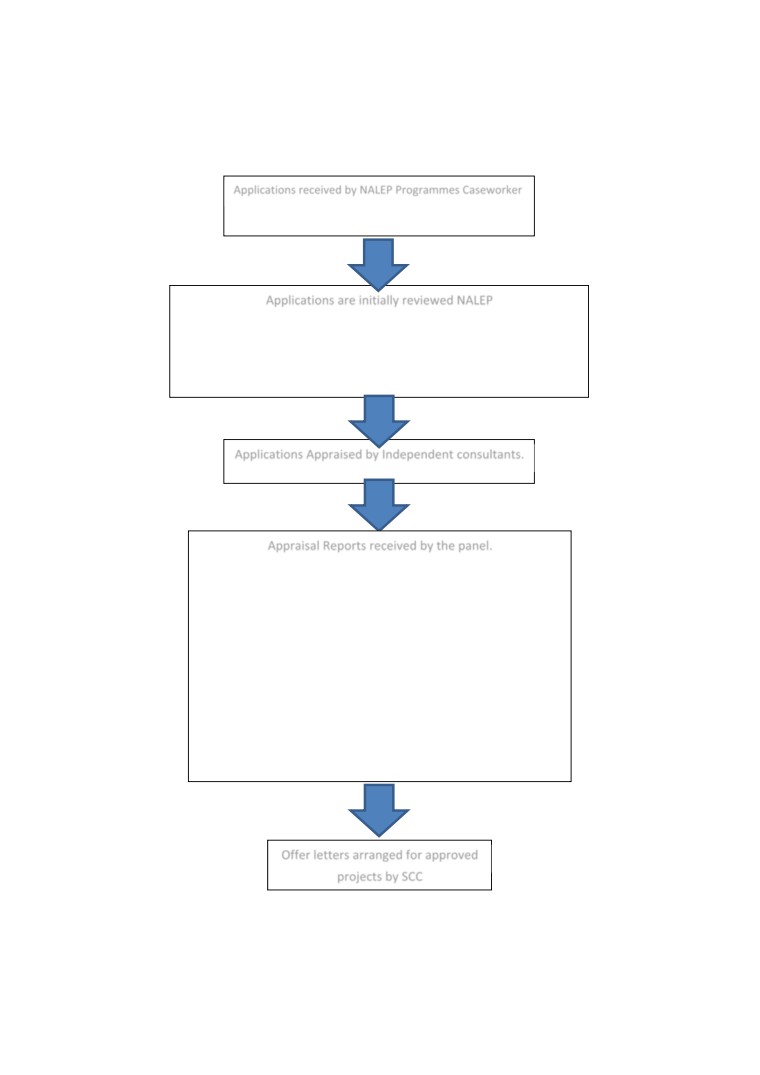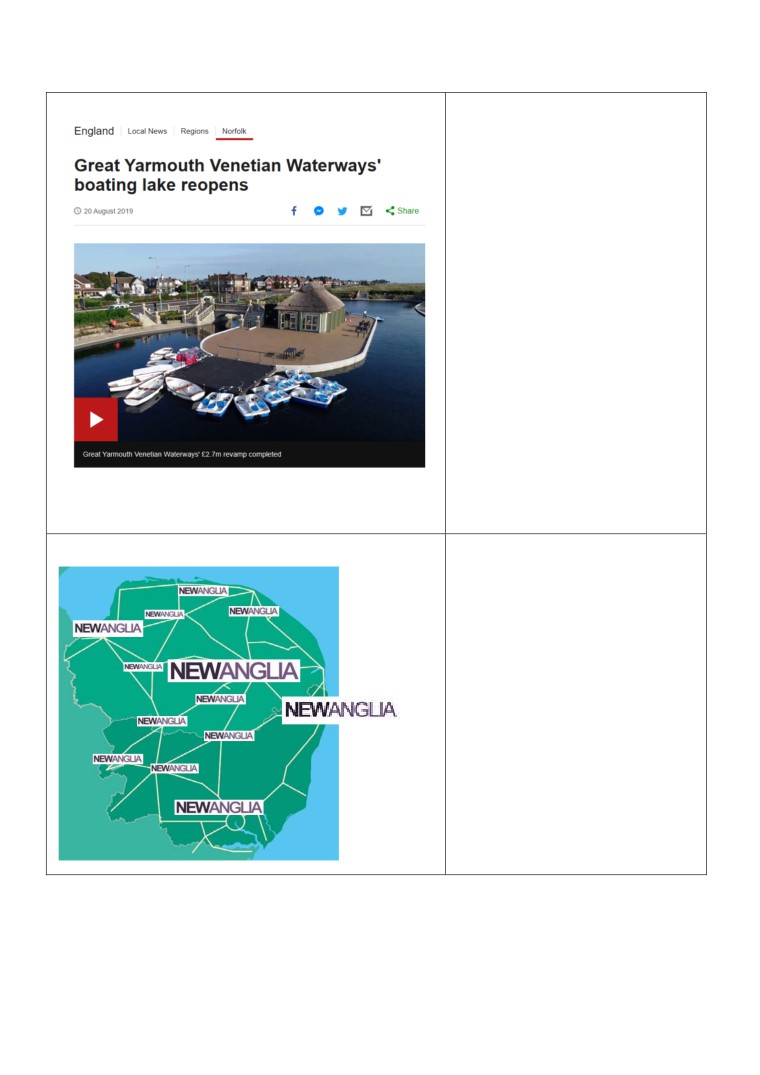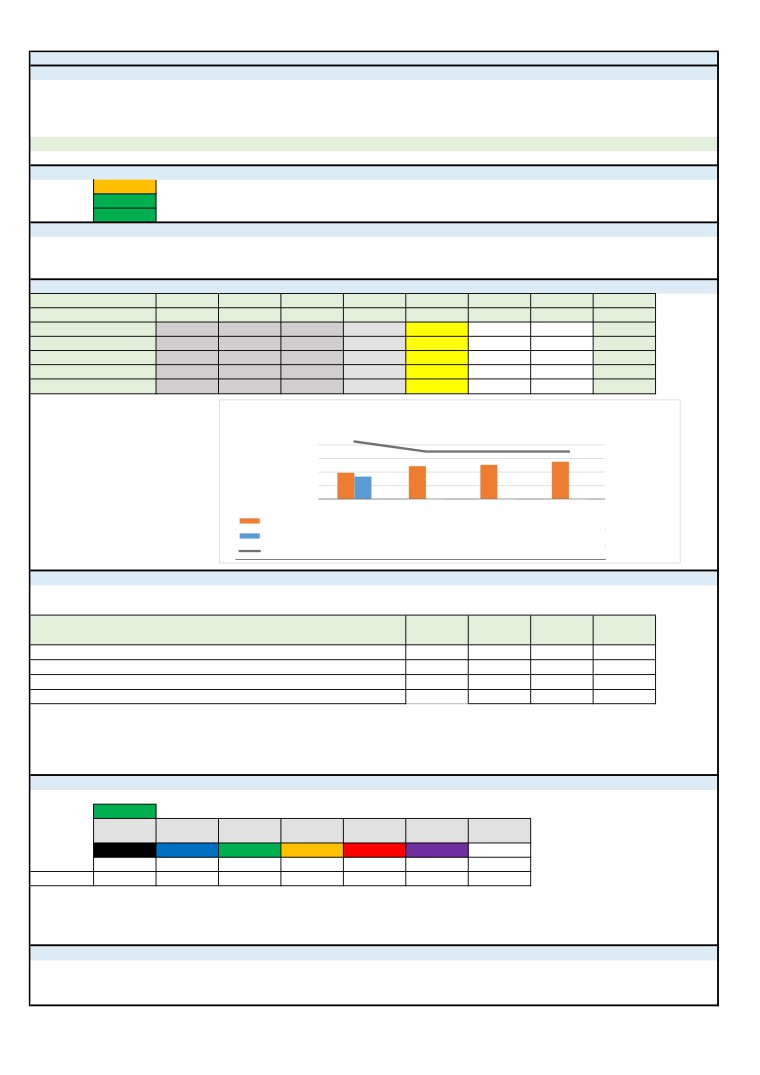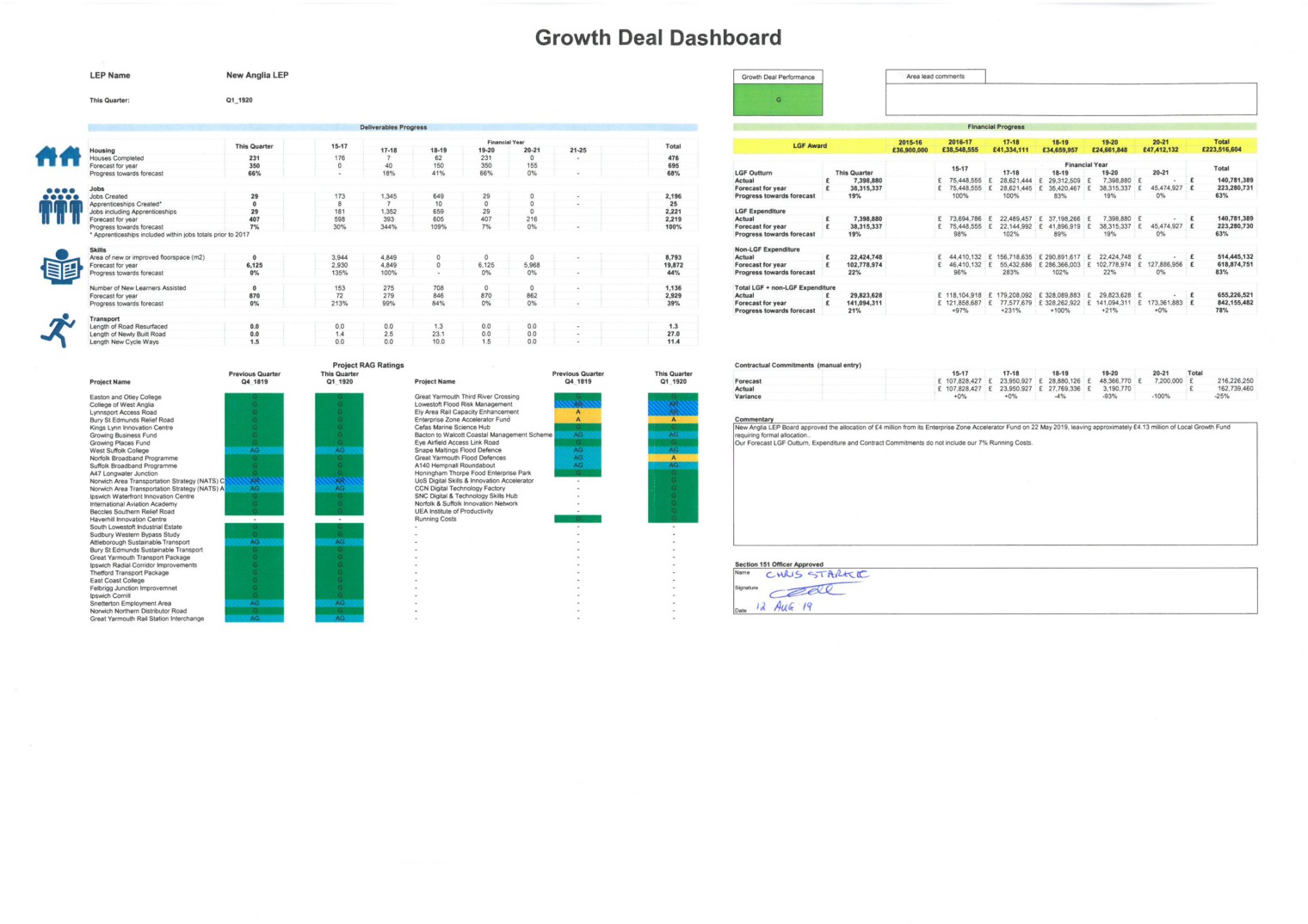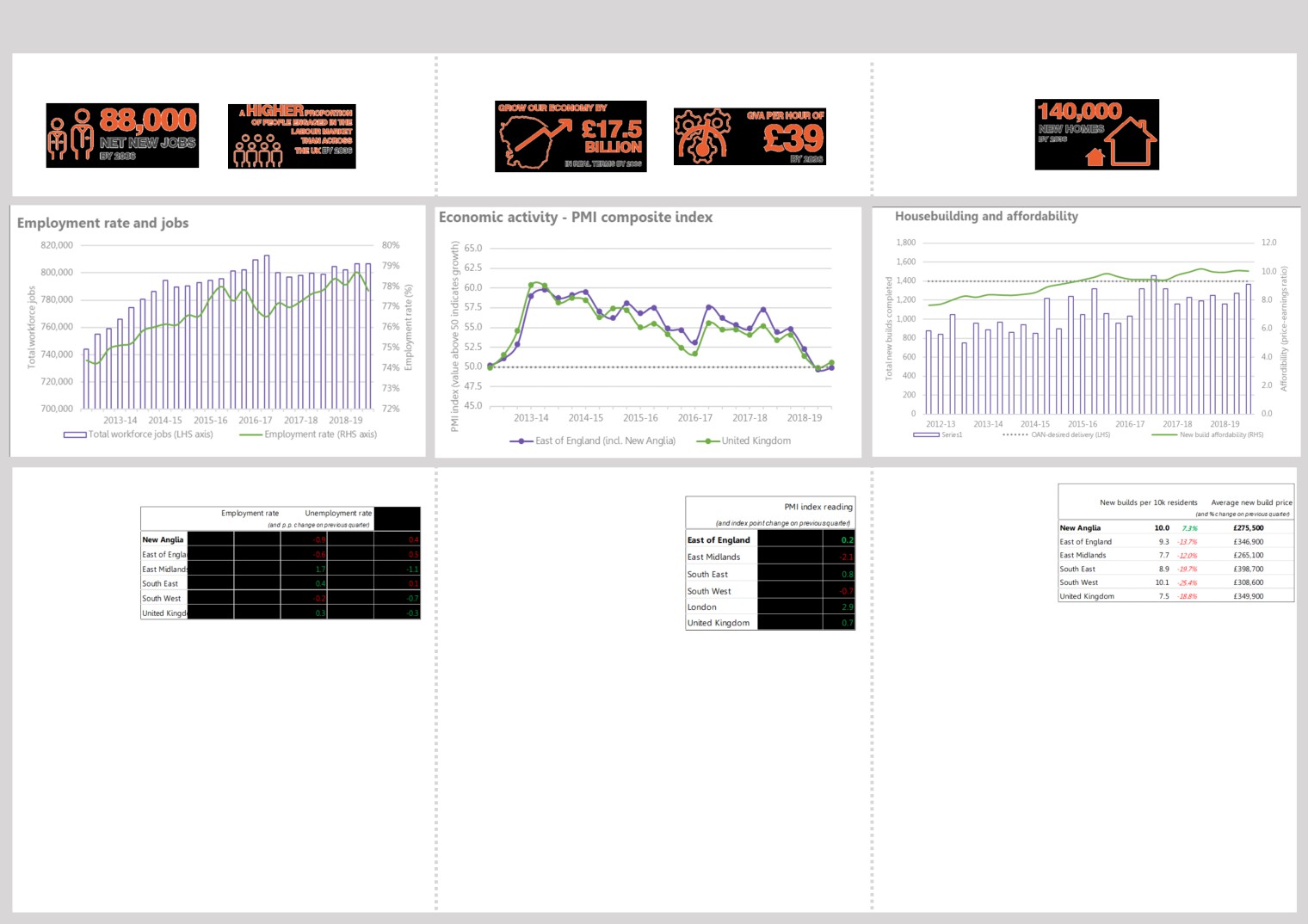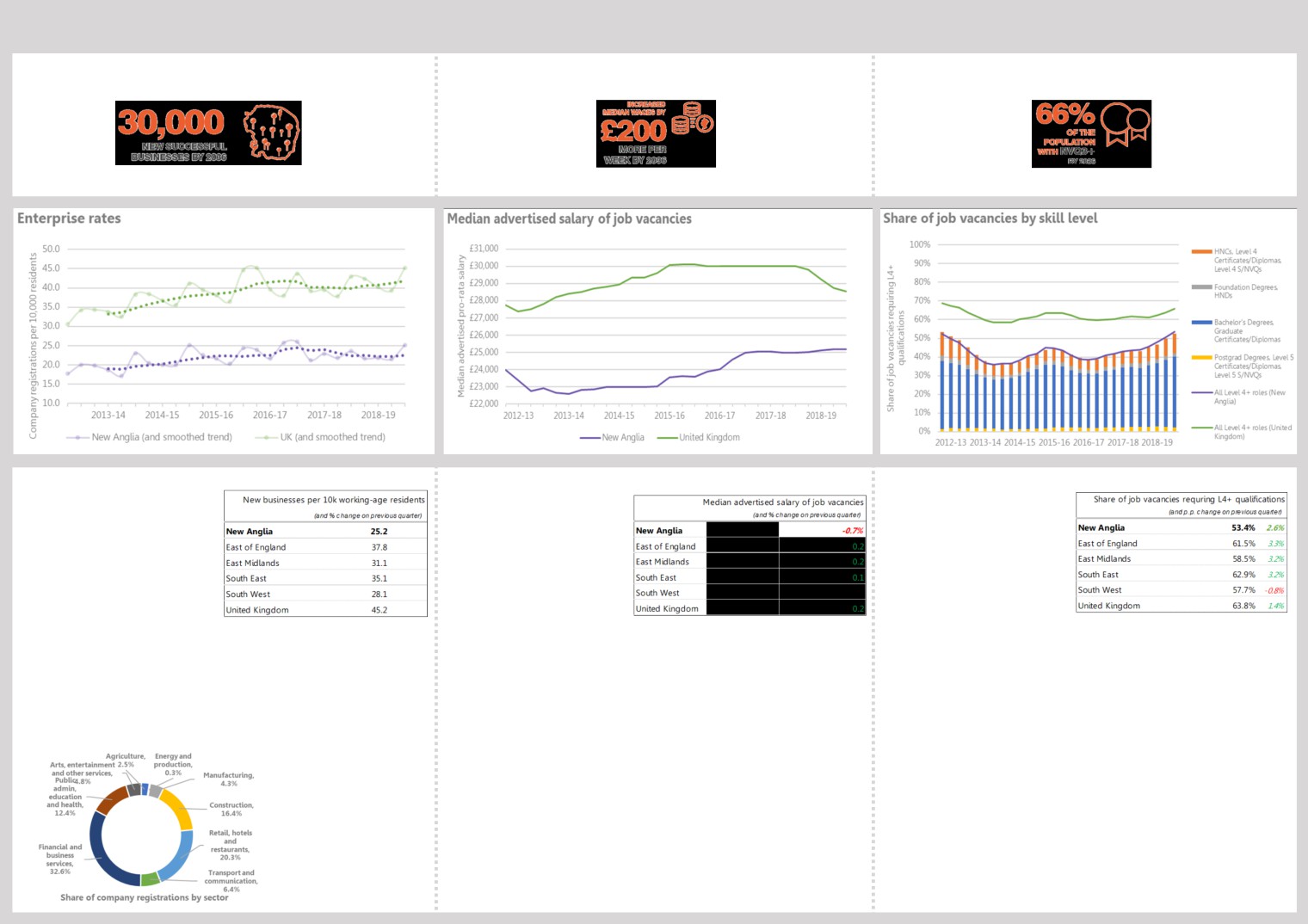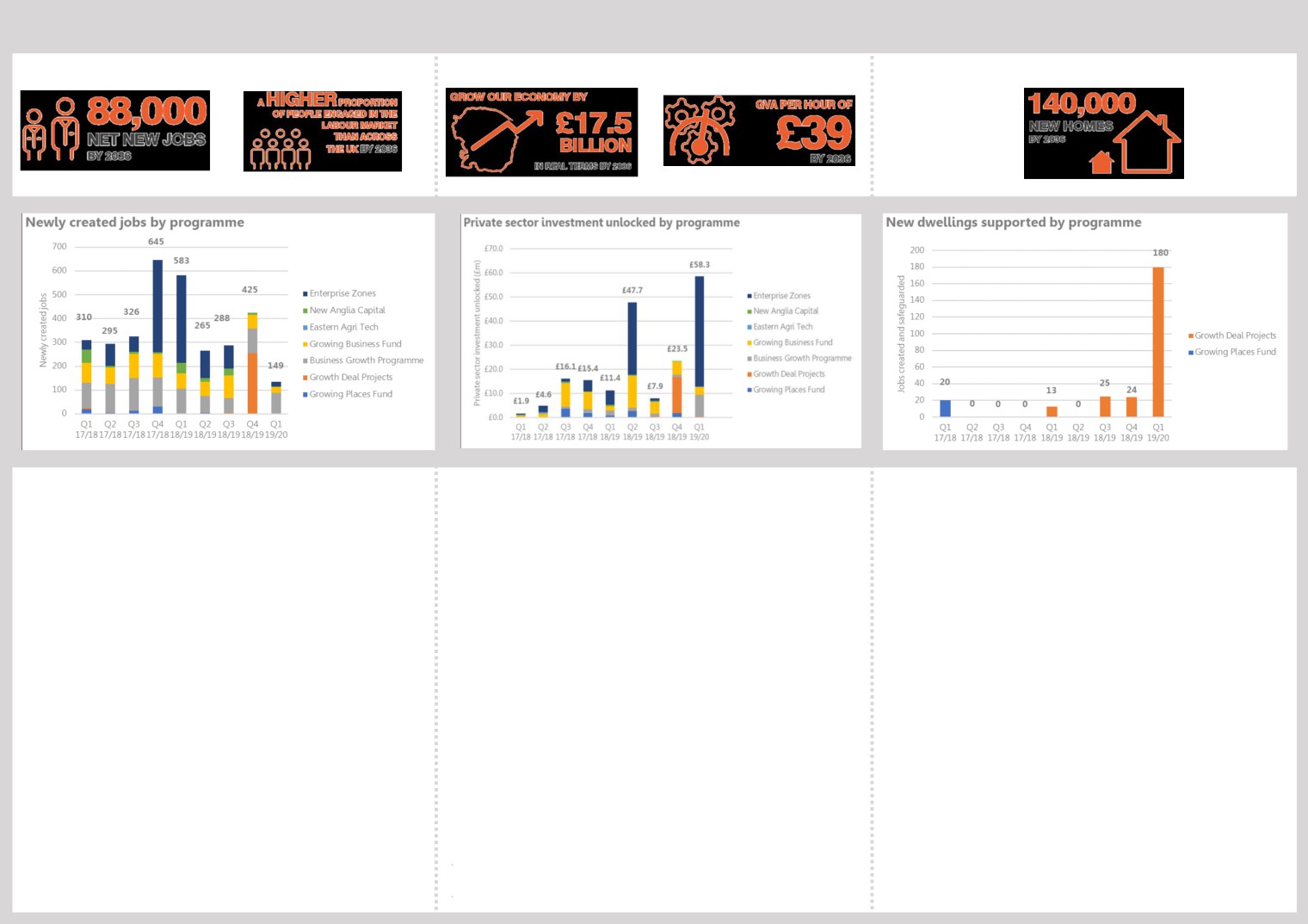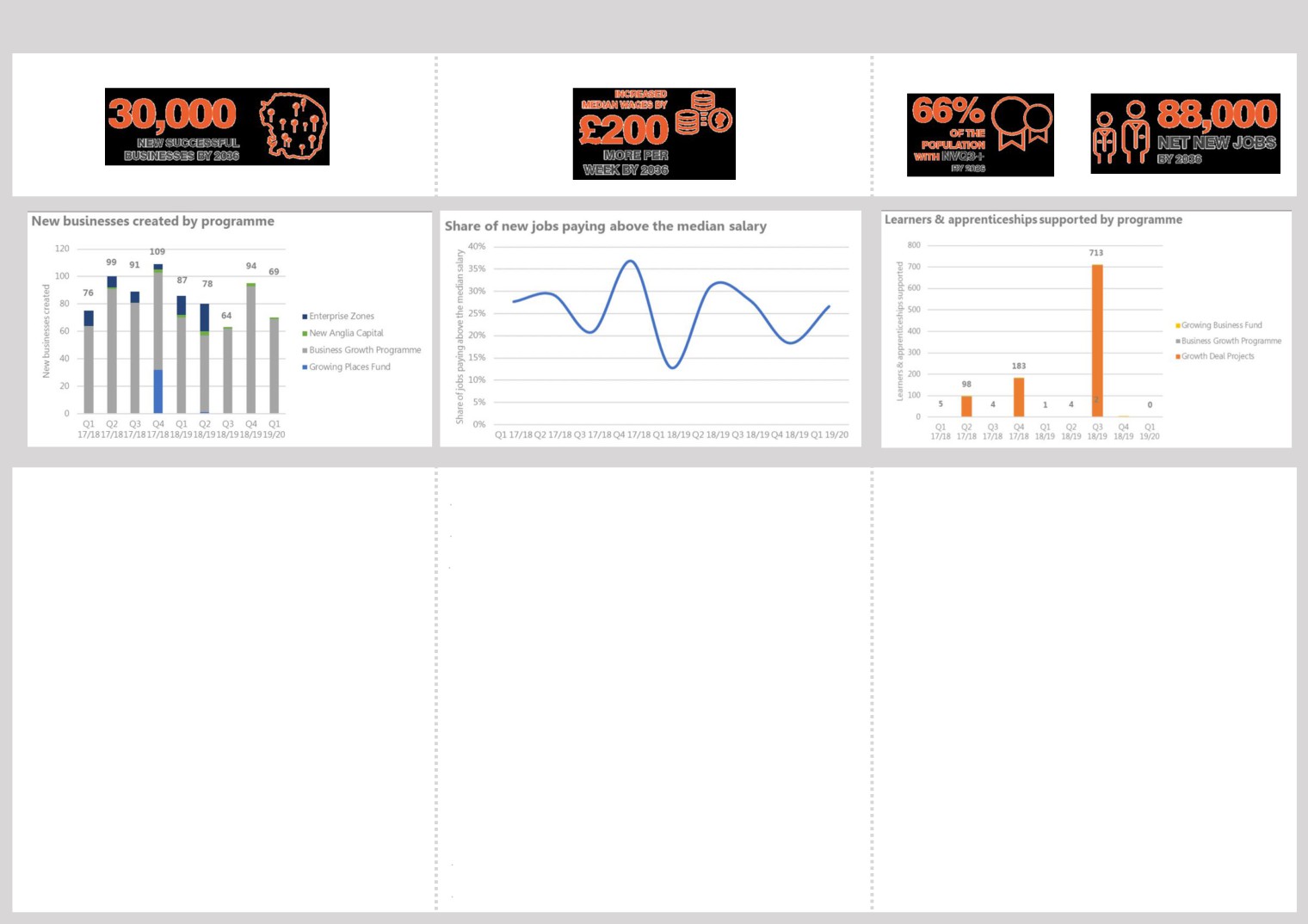New Anglia Local Enterprise Partnership Board Meeting
Wednesday 25th September
10.00am to 12.30pm
The Mess, Milsoms, Kesgrave Hall, Ipswich, IP5 2PU
Agenda
No.
Item
Duration
5 mins
1.
Welcome from the Chair
2.
Apologies
3.
Declarations of Interest
4.
Actions / Minutes from the last meeting
Forward Looking
35 mins
Update and
5.
Enterprise Zones
discussion
Governance and Delivery
40 mins
6.
Local Industrial Strategy
For Approval
Break
10 mins
Governance and Delivery
60 mins
7.
Apprenticeships Levy Transfer Pool
For Approval
8.
Innovative Projects Fund
For Approval
9.
Voluntary and Community Sector - Confidential
Update
10
Brexit
Update
Working Agreement with the Cambridge and Peterborough Combined
11.
For Approval
Authority
12.
Chief Executive’s Report including a Confidential Appendix
Update
Update and for
13.
September Programme Performance Reports including Dashboards
Approval
14.
Board Forward Plan
Update
15.
Any Other Business
Next Meeting: 10.00am - 12.30pm, 30th October
Venue: The Carnegie, Cage Lane, Thetford
1
New Anglia Board Meeting Minutes (Unconfirmed)
23rd July 2019
Present:
Claire Cullens (CC)
Norfolk Community Foundation
David Ellesmere (DE)
Ipswich Borough Council
Doug Field (DF)
East of England Coop
Matthew Hicks (MH)
Suffolk County Council
Pete Joyner (PJ)
Shorthose Russell
Johnathan Reynolds
Nautilus
Lindsey Rix (LR)
Aviva
Sandy Ruddock (SR)
Scarlett & Mustard
Alan Waters (AW)
Norwich City Council
Jeanette Wheeler (JW)
Birketts
Tim Whitley (TW)
BT
Attendees
Graham Plant (GP)
Great Yarmouth Borough Council - For Andrew Proctor
Catherine Richards (CR)
East Norfolk Sixth Form - For Nikos Savvas
Mark Ash (MA)
Suffolk County Council - For Sue Roper
Professor Andrew Lovett
UEA - For Item 6
Paul Winter (PW)
Skills Board Chair - For Item 7
Chris Dashper (CD)
New Anglia LEP
Ellen Goodwin (EG)
New Anglia LEP - For Item 6
Chris Starkie (CS)
New Anglia LEP
Natasha Waller (NW)
New Anglia LEP - For Items 7 and 8
Rosanne Wijnberg (RW)
New Anglia LEP
Helen Wilton (HW)
New Anglia LEP
1
Actions from the meeting: (23.7.19)
Action Log
Change the status column to “target date”
HW
Climate Change Adaption and Carbon Reduction Action Plan
Distribute the presentation to board members
HW
Apprenticeships Levy Transfer Pool
A business case is required which will be presented at the September meeting
NW
July Programme Performance Reports
A programme summary including performance against targets will be included in future NAC
CD
reports
1
Welcome from the Chair
Doug Field (DF) welcomed everyone to the meeting and thanked Jo Warr from Norwich Castle for
hosting.
DF advised that the agenda would be amended so that Item 7 would come before item 6 as the
Skills Board Chair had to leave the meeting early.
2
Apologies
Apologies were received from John Griffiths, Steve Oliver, Andrew Proctor, David Richardson, Sam
Chapman-Allen, Dominic Keen and Nikos Savvas.
3
Welcome from Norwich Castle
Jo Warr (JWa), Head of Development at Norwich Castle, welcomed the Board to Norwich Castle
and thanked the LEP for their support for the current Gateway to Medieval England Project which
aims to raise the profile of Norwich as a cultural centre.
JWa provided an overview of changes to the castle over the past century and reviewed the plans to
reinstate the Norman floor level and reconfigure the internal layout of the keep to replicate the
original rooms. The new layout will incorporate the British Museum Partnership Gallery which will
be the first permanent British Museum exhibition outside London .
When the project has been completed in the spring of 2021 the new design, along with improved
access to all levels, will allow the castle to host a much wider range of functions as part of the
project’s aim to establish the castle as a state of the art cultural and community venue.
4
Declarations of Interest
Full declarations of interest can be found at http://www.newanglia.co.uk/about-us/the-board.
Item 11: July Programme Reports: New Anglia Capital Report: DF declared an interest in Nova
Farina and SupaPass.
5
Minutes of the last meeting 25th June
The minutes were accepted as a true record of the meeting held on 25th June 2019.
Chris Starkie (CS) reviewed the action log. It was agreed to change the status to a date to
provide more detail.
ACTION: Change the status column to “target date”
HW
7
Skills Delivery Board
Paul Winter (PW), Chair of the Skills Board, addressed the meeting and highlighted key
elements of the report detailing the progress made over the past year notably delivery of
skills plans in additional sectors, reviewing Skills Deal projects and reaffirming the Youth
Pledge.
2
PW reviewed the process of setting up the new Skills Advisory Panel (SAP) as required by
Government where minor work is required to fulfil the requirements noting that the new
arrangements will require closer links between the LEP Board and the SAP.
DF asked for further details on the Governance requirements of the SAP. PW advised that
the voluntary sector needed to be included and discussions were underway with the
Community Foundations to address this. PW noted that the Board was currently very large
which may need to be addressed to ensure if remains effective.
The meeting discussed the implications of the end of the ESIF funding. CS advised that this
had been guaranteed by Government until the end of 2022 and would be replaced by the
Shared Prosperity Fund the details of which are still unknown.
Alan Waters (AW) noted that skills environment was very crowded which meant that it was
not always clear where companies could obtain support. PW agreed that there were too
many initiatives and that clarification was required.
The Board agreed:
• To note the content of the report
• To approve the transition from a Skills Board to a Skills Advisory Panel as required by
Government and to continue to endorse its activities
6
Climate Change Adaption and Carbon Reduction Action Plan
Professor Andrew Lovett (AL) addressed the meeting presenting the findings of the scoping
study into CO2 reduction as commissioned by the LEP.
AL advised that the report detailed observed changes in temperature when looking at trends
over two 30 year time periods which take fluctuations into account. It was noted that
Norfolk and Suffolk have experienced a 0.5 degree increase in temperature over summer
months and nearly a 1 degree rise in winter over the two 30 year periods studied.
The study then looked at projected changes based on 4 different pathways representing
different amounts of global surface temperature increase.
AL presented projected changes in temperature and precipitation and also in sea levels
noting that there were significant changes depending on the relevant pathway.
The report noted that there had been a 32% reduction in emission of greenhouse gases
since 2005 largely due to changes in manufacturing and in households but transport
emissions have not reduced by the same amount and consequently now make up a larger
share of CO2 emissions.
The meeting was advised that the national average for CO2 emissions was 5.4 tonnes per
person with both Norfolk and Suffolk slightly above this level. It was noted that to abide by
levels stated in the Paris Agreement this needed to reduce significantly to 1.7 tonnes per
person.
The data was presented split by local authority with variations reflecting the make-up of the
area. It also identified the 37 highest emitters which make up 22% of emissions.
LA advised that the study had identified key priorities where changes could be made and
where the LEP could provide support.
Domestically - adaptation of building stock to improve energy efficiency and develop
heating alternatives for off-gas areas.
Transport - increase public transport and use of electric vehicles with the associated
requirement for more charging points.
Agriculture - improved water management and enhanced carbon sequestration such as
tree planting schemes or improved cultivation processes
3
Energy - improved efficiency as demand increases along with enhanced distribution and
transmission.
Tim Whitley (TW) asked if the study provided a breakdown of transport by vehicle type as
this would assist in identifying which interventions would target the highest emitters. AL
advised that this is not currently part of the study and would require further research.
The meeting noted that the changes could not just be achieved by the LEP alone and
partners would need to work together to achieve the reductions. National policy will also
play a key role.
The Board discussed the issues around bringing in offshore power.
Johnathan Reynolds (JR) advised that the SE energy hub was in the very early stages of
looking at an offshore energy grid and this was vital to the development of the offshore
energy sector. Matthew Hicks (MH) confirmed that 30% of the UK’s energy came ashore
at Sizewell but that development was being done on a piecemeal basis will a lack of
connectivity between projects.
Lindsey Rix (LR) suggested that the LEP could support those companies looking to become
carbon neutral.
David Ellesmere (DE) proposed targeting support for the largest emitters and also for the
LEP to coordinate purchasing requirements related to CO2 reduction in order to provide
increased buying power.
JR noted that the findings of the scoping report needed to be considered in every decision
the Board made and the LEP needed to identify those gamechanger projects which support
CO2 reduction and identify gamechanger projects and carbon offsetting ideas.
The Board agreed:
• To note the content of the report and presentation
• To support the development of an action plan to tackle some of the key findings of the
report
• To receive the presentation
HW
In order to ensure the Annual Accounts were signed off it was agreed that Item 12 would be
addressed before Item 8.
12
Draft Annual Financial Statements - Confidential
RW confirmed that the accounts had been reviewed by the Audit & Risk Committee on 1st
July and changes agreed that the meeting have been made.
DF noted that the LEP now employed over 50 people and proposed discussing with CS how
HR could be monitored going forward.
The Board agreed:
• To note the contents of the report
• To approve the annual financial statements and audit management letter for signing by
the Chair
8
Apprenticeships Levy Transfer Pool
CS presented the proposal to the meeting providing the background to the issues facing
apprenticeship schemes and the proposal to make the funds available for apprenticeships.
The LEP will act as a promoter of the scheme and work with SMEs to ensure they have the
tools and equipment in place to utilise it. CS advised that Aviva has already signed up and
other large companies are being approached
4
CS confirmed that the scheme will need ongoing funding and a meeting with county
representatives will take place in August to progress the business case. A more detailed
plan will be presented at the September Board.
DE proposed that, if successful, the scheme could be expanded and if there is sufficient
demand for specific training this could be used to request additional courses locally.
The Board agreed:
• To note the content of the report
• To approve the £60,000 budget to develop a cost-effective model to support the transfer
of apprenticeship levy to SMEs in partnership with colleagues from Norfolk and Suffolk
County Councils
• To receive a business case at the September board meeting
9
Growing Business Fund: Large Company Grant Programme
Chris Dashper (CD) reviewed the proposal which has already been approved by the IAC
noting that one application has already been received and approved by the IAC subject to
Board approval of the programme.
Jeanette Wheeler (JW) confirmed that this programme would help the Growing Business
Fund Panel where it has been challenging to make applications meet the criteria required for
the other funds.
The Board agreed:
• To note the content of the report
• To approve the introduction of a GBF Large Company Grant programme
MH left the meeting
10
Chief Executive’s Report
CS highlighted key items in the report and asked for questions.
LIS - Further strategies have now been published. New Anglia will publish its LIS in October
having been brought forward to the 2nd wave.
Place Branding - This will be launched at the AGM and the invitation will go out this week to
approximately 300 businesses and partners.
The Board agreed:
• To note the content of the report
11
July Programme Performance Reports
Rosanne Wijnberg (RW) reviewed the reports for July.
Business Growth Programme - The Programme is on track to meet its spend target and
new activity for the next three years is being finalised. The process of seeking additional
ERDF funding to extend the Small Grants Scheme for a further year has begun.
New Anglia Capital- CD reviewed the report and asked for questions from the Board.
DF asked for details of the split between NAC and private funding. CD advised that overall
NAC has invested 40% of funds to the 60% provided by private funding. This is against a
target of a 50/50 split.
DF requested the inclusion of a summary highlighting progress against targets.
ACTION: The summary from the NAC Board report will be included in future NAC
CD
programme reports.
The Board agreed:
5
• To note the contents of the report
13
Management Accounts - Confidential
The Board agreed:
• To note the content of the report
14
Board Forward Plan
CS reviewed the Forward Plan and asked for requests for additional items.
The Board agreed:
• To note the content of the plan
15
Any Other Business
JW proposed bringing younger entrepreneurs to a future Board meeting to engage them in
the work of the LEP.
Next meeting:
Date and time of next meeting:
10.00am - 12.30pm, 25th September 2019
Venue: The Mess, Kesgrave Hall, Ipswich.
6
Actions from New Anglia LEP Board Meetings
Date
Item
Action
Update
Actioned
Target Date
By
23/07/2019
Action Log
Change the status column to “target date”
HW
Complete
23/07/2019
Climate Change Adaption and
Distribute the presentation to board members
Complete
HW
Carbon Reduction Action Plan
23/07/2019
Apprenticeships Levy Transfer
A business case is required which will be presented at the September
Included on the agenda for the September Board
Complete
NW
Pool
meeting
23/07/2019
July Programme Performance
A programme summary including performance against targets will be
To be included in the next NAC report in January 2020
Jan-20
CD
Reports
included in future NAC reports
25/06/2019
GE Update Report
To provide the Board with regular reporting of the pipeline of visits relating
To be included in the next Inward Investment update report
JM
Jan-20
to inward investment and subsequent outcomes
25/06/2019
AOB
UEA Enterprise Fund - Any board member wishing to sit on the board should
A Board member is still required to sit on the Enterprise Fund Board
All
Oct-19
contact Chris Starkie
23/05/2019
Growth Hub Presentation
Growth Hub Annual review to be circulated to the Board when published
Expected autumn 2019
CD
Nov-19
23/11/2018
Infrastructure
For the LEP team to ensure that links are progressed with other sub-national
Progress will be included in the next infrastructure update in October
EG
Oct-19
transport bodies
9
New Anglia Local Enterprise Partnership
Board Decision Log - Public
Date
Decision
Decision Made
Making Body*
7/8/19
Growing
The Panel approved the following applications:
Business Fund
• William Morfoot Limited - Agreed to support
Panel
Approved Grant: £50,000
• Timber Frame Management Limited - Agreed to support
Approved Grant: £35,662
23/7/19
LEP Board
The Board made the following decisions:
Skills Delivery Board
To approve the transition from a Skills Board to a Skills Advisory Panel as required by Government and to continue to endorse its activities
Climate Change Adaption and Carbon Reduction Action Plan
To support the development of an action plan to tackle some of the key findings of the report
Draft Annual Financial Statements
To approve the annual financial statements and audit management letter for signing by the Chair
Apprenticeships Levy Transfer Pool
To approve the £60,000 budget to develop a cost-effective model to support the transfer of apprenticeship levy to SMEs in partnership with
colleagues from Norfolk and Suffolk County Councils
Growing Business Fund: Large Company Grant Programme
To approve the introduction of a GBF Large Company Grant programme
23/7/19
Investment
The IAC made the following decisions:
Appraisal
Growing Places Fund Large Company Grant Request (Confidential)
Committee
To approve a grant of £379,318 subject to approval of the capital grant programme by the board, provision of a suitable State Aid statement by
the applicant and evidence of confirmation by the parent company that the company would remain in Norwich.
3/7/19
Growing
The Panel approved the following applications:
Business Fund
• Creative Displays Limited - Agreed to support
Panel
Approved Grant: £40,000 - awarded under de minimus
• Bendart Limited - Agreed to support
Approved Grant: £42,500
• Hugh Crane Cleaning Equipment - Agreed to support
Approved Grant: £56,369
• Anglian Indoor Karting Ltd - Agreed to support
Approved grant: £40,000
• Stephen Walters and Sons Limited - agreed to support
Approved grant: £118,049 - awarded under de minimus
25/6/19
LEP Board
The Board made the following decisions:
Capital Growth Programme - Institute of Productivity
To approve the award of Capital Growth Programme grant funding of £4.461m to the Institute of Productivity
MIPIM Update Report and Proposal for 2019
To approve the proposal including spend of £28,788, the covering approach, format and costings for MIPIM UK 2019
* New Anglia Local Enterprise Partnership Board, Investment Appraisal Committee, Growing Business Fund Panel, Remuneration Committee, Audit & Risk Committee
New Anglia Local Enterprise Partnership Board
Wednesday 25th September 2019
Agenda Item 5
Enterprise Zones: Progress Update
Author: Julian Munson/Eunice Edwards. Presenter: Julian Munson
Summary
To provide a progress update report on New Anglia Local Enterprise Partnership’s two
Enterprise Zones;
1. Great Yarmouth & Lowestoft (New Anglia) Enterprise Zone (started 2012) & extensions
(started 2017).
2. Space to Innovate Enterprise Zone (started 2016).
This report will cover Enterprise Zone outputs to date, strategy, timeline and forward plan for
delivery (to 2021).
Appendices A and B are the September Enterprise Zone Programme Performance Reports.
Recommendation
The Board is asked to note progress and endorse the proposed strategy and forward plan.
Background
New Anglia LEP successfully bid to Ministry of Housing, Communities and Local Government
(MHCLG) for two ‘multi-site’ Enterprise Zones in Norfolk & Suffolk.
Enterprise Zones are designated areas that provide business rates discounts of up to £275k
over a five-year period to businesses if locating in the zones in the first 5/6 years & simplified
planning. Enterprise Zones are part of the Government’s wider Industrial Strategy to support
businesses and enable local economic growth.
The Great Yarmouth & Lowestoft Enterprise Zone began in April 2012 & encompasses six
sites; Beacon Park in Gorleston, South Denes in Great Yarmouth, Riverside Road in Lowestoft,
Mobbs Way in Oulton, South Lowestoft Industrial Estate in Lowestoft and Ellough in Beccles.
Four of these sites (Beacon Park, South Denes, Mobbs Way and Riverside) were also awarded
extensions where benefits started in 2017. This Enterprise Zone has an energy sector focus.
The Space to Innovate Enterprise Zone began in April 2016 and encompasses 10 sites;
Norwich Research Park, Suffolk Park in Bury St Edmunds, Scottow Enterprise Park near
Coltishall, Egmere Business Zone near Wells-next-the-Sea, Nar Ouse Business Park in King’s
Lynn, Stowmarket Enterprise Park (Gateway 14) and the 4 sites in the Ipswich area are Princes
Street, Futura Park, Waterfront Island and Sproughton Road (Eastern Gateway). The sectors
identified for this Enterprise Zone include: agri-tech, food and health, offshore energy, the green
1
13
economy, ICT and digital creative sectors in which Norfolk and Suffolk has a competitive
advantage.
Enterprise Zones have established themselves as a driving force of local economies as they
unlock key development sites, consolidate infrastructure, attract business and create jobs.
Both EZ’s have long range stretch targets they are working towards with annual targets set with
local authority partners each year. However, progress to date on some sites has been slower
than expected.
Outputs are recorded and reported on a quarterly basis to MHCLG and New Anglia LEP Board.
Activity across the two Enterprise Zones is coordinated by two partnership/development
groups, chaired by New Anglia LEP, involving County and District/Borough Council officers and
MHCLG.
In Summary, to date*, the Great Yarmouth & Lowestoft Enterprise Zone has delivered 1806
Jobs, 806 construction jobs, 63 businesses, £51.25m private investment, £177m public
investment, 20.9ha land developed & 54,455 Sqm floor-space (new and refurbished). Despite
slower progress in earlier years due to the slow down in the oil and gas sector, most of the sites
are now progressing well with good delivery on Beacon Park and further development forecast
for Ellough and around Great Yarmouth port.
To date the Space to Innovate Enterprise Zone has delivered 1151 Jobs, 1723 construction
jobs, 104 businesses, £89m private investment, £132m public investment, 69.2ha land
developed and 83,578 Sqm of floor-space (new and refurbished). In terms of progress against
the 5-year target there is a lag in net number of new businesses and numbers of jobs for some
of the Space to Innovate sites with a couple of the sites experiencing limited progress due to
external factors such as land ownership issues and gaps in infrastructure investment.
(Construction jobs are included in our figures as part of the reporting to Government. A
construction job is counted as a new permanent full time equivalent job created by the
construction activity which are expected to last for at least 26 weeks).
All business rates growth generated by the Enterprise Zones are kept by the Local Enterprise
Partnership and local authorities in Norfolk & Suffolk for 25 years to reinvest in local economic
growth. This reflects the Government’s commitment to long-term economic growth and enables
LEPs to reinvest in site development and other local initiatives.
For the New Anglia Enterprise Zones, the 100% retained rates is split into 4 separate funds;
Fund A1 is for the Collecting (or District) Authority
Fund A2 is for the County Council
Fund B is for the development of the Enterprise Zone sites
Fund C is for New Anglia LEP to fund activity in the Economic Strategy for Norfolk and Suffolk.
New Anglia LEP has strong governance arrangements in place with legal agreements and
MOUs with delivery partners, as required, and Site Delivery Plans signed off by all partners.
*Latest figures to end of Q1 June 2019
Key Considerations
Enterprise Zones remain a key priority programme for New Anglia LEP. They not only
demonstrate an effective method of intervention to unlock and accelerate the development of
key commercial sites but also support local economic development and job creation. In
addition they also enable the retention of business rates income to further enhance the
development and delivery of sites and provide an additional source of income for New Anglia
LEP for other project activity.
2
14
This programme has proven to be effective in unlocking and accelerating commercial
development in the Great Yarmouth and Lowestoft Enterprise Zone and in the case of the
Beacon Park site for example has had a highly significant impact on business investment and
jobs growth for the energy sector supply chain in that area.
There has also been good progress on the majority of the Space to Innovate Enterprise Zone
sites, particularly over the past 12 months. New Anglia LEP continues to work closely with
partners to ensure that we identify creative ways of removing any barriers to development and
provide an even stronger focus on delivery over the next 12-18 months.
There are cases where development has been limited though and the issue of land ownership
and level of ambition to build can be a major factor inhibiting progress. New Anglia LEP with
Local Authority partners has attempted to overcome these barriers in some cases through the
new EZ Accelerator Fund and opportunities around land acquisition and co-investment to help
‘kick start’ new development. Despite this, at least three of the EZ development sites have
effectively stalled and progress is not expected in the short term (without major intervention).
It is also important that the Enterprise Zones ‘offer’ is more proactively marketed through
various channels and leveraging the Growth Hub, grants programmes and inward investment
activity in a more coordinated and targeted way. For example, the new Norfolk and Suffolk
inward investment website (with Norfolk and Suffolk branding) offers a new channel in which to
actively promote the Enterprise Zone sites.
It is important to note that a priority for Enterprise Zones is encouraging a net increase in
investment, business growth and job creation and so careful consideration is always given to
minimising ‘displacement’ within the locality of all enterprise zone sites.
Most of the Enterprise Zone sites have demonstrated the opportunity for businesses to expand
locally rather than risk relocating outside the area. Examples include LDH La Doria at the
Sproughton Enterprise Zone and NOCN at Nar Ouse Enterprise Zone.
The structure of the EZs prevents businesses simply relocating from existing premises to take
advantage of the financial benefits provided by the sites. That is because the capital cost of
new premises, coupled with the increased rent paid, is significantly greater than the incentives
on offer.
The financial package does however provide an incentive for businesses who are considering
relocating to larger premises or moving into Norfolk and Suffolk making that investment
decision.
Most of the Enterprise Zone sites also have a specific sector focus ensuring that we can retain
and attract jobs in those sectors that align with the Economic Strategy.
For example, Great Yarmouth and Lowestoft; energy - advanced manufacturing and logistics;
Princes Street, Ipswich - financial services, ICT digital; Norwich Research Park - food, agri-
tech and life sciences.
There are also some local business rates policies in place for specific sites such as Futura
Park, Ipswich to ensure that some sectors e.g. retail, are not eligible for the business rates
discount, therefore deterring certain sectors & encouraging preferred ones.
Link to the Economic strategy
The New Anglia Enterprise Zone sites are all located in the Priority Places identified with the
new Economic Strategy. These include the Ipswich area, Norwich area, Norfolk/Suffolk Energy
Coast (including North Norfolk, Great Yarmouth and Lowestoft areas), A14 Corridor
(Stowmarket and Bury St Edmunds) and the A47 Corridor (King’s Lynn).
3
15
As an incentive-based programme focused on unlocking and delivering growth on key
commercial sites, Enterprise Zones support the objectives of the following priority themes;
Our Offer to the World
Driving Business Growth and Productivity
Collaborating to Grow
Competitive Clusters, Close to Global Centres
The EZs also play a critical wider role in the delivery of the Economic Strategy through income
generated by Pot C.
Pot C funding is used by the LEP to support wider economic growth and in particular the
Innovative Projects Fund. This ensures that all parts of the area benefit from the success of the
Enterprise Zones. Pot C funding is also used to fund the Enterprise Adviser Network.
Next Steps
There has been significant progress on both the Great Yarmouth and Lowestoft Enterprise
Zone and Space to Innovate Enterprise Zone with some good examples of partnership working
between New Anglia LEP, Local Authorities and private sector developers unlocking potential
on key sites. However further work is required to generate and strengthen the pipeline of
potential enquiries for the Enterprise Zones to help progress with meeting business and job
targets.
The forward plan is;
A stronger focus at MIPIM UK to promote specific sites such as Nar Ouse, Ellough and
Norwich Research Park
Targeted campaigns for potential inward investors and high growth companies via the
new Norfolk and Suffolk Unlimited marketing activity and also the Growth Hub
Recommendation
The Board is asked to note progress on the Enterprise Zones and provide feedback and ideas
on the proposed approach and forward plan to help raise the profile of the Enterprise Zone
development opportunities and strengthen the investment pipeline.
4
16
New Anglia Local Enterprise Partnership Board
Wednesday 25th September 2019
Agenda Item 6
Local Industrial Strategy (LIS)
Author: Lisa Roberts Presenter: Lisa Roberts
Summary
This report provides an update on the development of the Norfolk and Suffolk Local Industrial
Strategy and seek sign off from the Board.
Recommendation
The Board is asked to:
endorse and sign off the Norfolk and Suffolk Local Industrial Strategy- Appendix A; and
delegate authority to the LEP Chair and CEO to agree amendments made following the
LEP Board and any further amendments made by Government
Background
The Norfolk and Suffolk Local Industrial Strategy has been developed in partnership with
business, education and local authorities.
This process began in March with a session involving leaders from local authorities, business
and education where the overall approach and aims for the strategy were agreed.
These were:
a) The Industrial Strategy is an opportunity to drive implementation what has already been
agreed in terms of goals and priorities agreed in 2017 - not start again - we don’t need
“another strategy.”
b) We should focus on the global and national trends that will shape the future of our
businesses and communities and focus on the actions to continue to support
businesses to take the opportunities ahead as the post-Brexit economy evolves.
c) The Local Industrial Strategy will set out the case for continued investment in the
Norfolk and Suffolk economy and provide more detail about how we will deliver the
biggest opportunities for growth and productivity that we identified in our strategy.
d) The Industrial Strategy should be built around the three large scale economic
opportunities that are identified in the Economic Strategy as being where we have
strongest competitive advantage. These are:
Agri-food / Agri-tech
Clean energy
ICT and Digital
e) Each strategic opportunity provides significant scope for high skilled jobs, supply chain
firms and improving in-work progression and skills for our communities. We are also
1
19
proposing to reinforce the actions set out in the Economic Strategy to drive overall
business growth and productivity.
Following the leaders’ session in March, more than 20 consultation events were held with
stakeholders involving around 400 individuals, examining the economic evidence, developing
ideas and testing proposed interventions.
A second leaders’ event took place in June where emerging ideas and interventions from the
business engagement events were tested and the golden thread of Clean Growth agreed.
The third and final session with leaders’ takes place on 18th September. The aim of this session
is to provide an overview of the strategy and receive support from leaders on the document
ahead of adoption by the LEP board and beginning the sign off process with Government.
In addition, an Independent Economic Expert Panel was established to act as a critical friend,
offering independent expert advice.
This panel reviewed the evidence and proposed interventions, providing a number of
recommendations which were included in the strategy.
Members include Professor Tim Besley from LSE, Rebecca Riley from University of
Birmingham, Alex Plant from Anglian Water and David Campbell from the Department of
Business, Energy and Industrial Strategy.
Structure of the strategy and Link to the Economic Strategy
The document has been developed to align with the government’s framework for Local
Industrial Strategies and link with the national industrial strategy.
It also builds on the Economic Strategy for Norfolk and Suffolk which was endorsed by all local
authorities in autumn 2017 and focuses on productivity and inclusive growth.
The Economic Strategy for Norfolk and Suffolk remains the blueprint for growth to 2036 and the
local industrial strategy forms part of the delivery mechanism for this strategy.
As agreed with leaders in March, the local industrial strategy focuses on three opportunity
areas: Clean energy, agri-food and ICT/digital creative.
The strategy does also recognise the importance of a number of underpinning sectors such as
ports and logistics and culture and the visitor economy and financial services and sub-sectors
such as the equine industry, which underpin the economy.
The golden thread which runs through the local industrial strategy is clean growth - with
Norfolk and Suffolk positioned as the UK’s clean growth region.
Each of the three opportunity areas have a number of proposed interventions aimed at
capitalising on these opportunities.
The strategy is then structured around the five foundations of growth identified in the national
industrial strategy and our response to these foundations.
The foundations are: Ideas, people, infrastructure, business environment and places. The
strategy outlines our assets in these areas and proposed interventions to boost productivity,
support inclusive growth and capitalise on our three opportunity areas.
Purpose of the strategy
The development of the strategy has helped focus attention on the key building blocks of our
economy, understand the areas with greatest potential and identify interventions to unlock this
potential.
2
20
Whilst there is no funding specifically set aside by Government for the implementation of local
industrial strategies, by signing up to the document Government is endorsing its aims and
ambitions.
It means that existing Government policy and future plans will need to take into account the
local industrial strategy.
Plans are in place in a number of areas with a number of Government departments to see how
key elements of the strategy can be taken forward.
The process has also significantly raised the profile of our economy and its key components
within Whitehall.
The strategy also provides an agreed plan for local partners to utilise, in tandem with the
Economic Strategy.
We will be developing a plan to take forward the interventions identified in the document and
whilst funding will be required to take forward some of the proposals, funding is in place for
many of the schemes.
Local Authority Endorsement
The draft Local Industrial Strategy is in the process of being endorsed by local authorities
across Norfolk and Suffolk.
As of 18th September, seven local authorities have endorsed the Strategy. These are: Babergh,
Breckland, Great Yarmouth, Mid Suffolk, North Norfolk, Norwich and Suffolk County Council.
We are anticipating endorsement from most of the remaining authorities before the LEP board
meeting, with a couple scheduled to endorse following the LEP board.
Feedback from those who have endorsed to date have been included in the version of the LIS
at appendix A.
Next steps
After the LEP Board signs off the Strategy it will then enter the sign off process with
Government, with a view to publication during October, although this timeline is subject
to external factors.
This process involves the document being shared with Government departments for
their review and sign off, before being officially signed off by ministers.
The draft attached is therefore a working draft which is subject to amendment by
Government departments and ministers before publication by Government.
It is understood that once agreed by Government and the LEP, three weeks before
publication the government LIS design team will produce a designed version which will
follow the framework of those that have been published to date.
Recommendation
The Board is asked to:
endorse and sign off the Norfolk and Suffolk Local Industrial Strategy; and
delegate authority to the LEP Chair and CEO to agree amendments made following the
LEP Board and any further amendments made by government.
3
21
New Anglia Local Enterprise Partnership Board
Wednesday 25th September 2019
Agenda Item 7
New Anglia Apprenticeship Levy Transfer Pool business case
Author: Natasha Waller
Presenter: Chris Starkie
Summary
The July LEP Board agreed to fund an Apprenticeship Levy Sharing Coordinator position which
will be hosted by the LEP. Since the board meeting good progress has been made including
recruiting a coordinator. In addition to agreeing the funding the board requested an outline
business plan and this paper sets out the purpose of the new role in greater detail with
timelines and targets.
Recommendation
The LEP Board endorse the outlined business plan
The LEP Board endorse a further £60,000 of funds to allow support to continue for an additional
year
Background
Apprentice numbers have dropped significantly in recent years due to apprenticeship reforms
making businesses more cautious, new standards not being available and/or more training
being focussed on existing staff members.
Across the East of England, apprenticeship starts have declined from 46, 650 (2015-16) to 36,
700 (2017 - 18). The biggest impact has been on the Level 2 Intermediate Apprenticeships
which have fallen from 25, 640 to 14, 620 in that time period. The 16 - 24 year old age group
are the biggest age group impacted.
This mirrors the national picture with starts falling from 509, 360 (2015 - 16) to 375, 760 (2017
- 18).
Intervention is required in order to boost the number of apprenticeship starts particularly
amongst SMEs, which make up the vast majority of employers in the area. At the July Board,
an initial budget of £60,000 was allocated to fund the development and first year running costs
of the New Anglia Apprenticeship Levy Transfer Pool.
Progress since the July board
Since the July Board, there has been a further meeting between the LEP, Norfolk County
Council and Suffolk County Council. It was agreed that we would align our commitments
around apprenticeships to further encourage apprenticeship awareness, growth and levy
transfer.
1
23
Recruitment of the coordinator has taken place and following interviews as of September 18th
an appointment is due to be made.
Our project was also praised by Gavin Williamson, Education Secretary, in the House of
Commons in response to a question about apprenticeships from Waveney MP Peter Aldous. Mr
Williamson said the initiative had the Government’s support.
We are in regular contact with the Education and Skills Funding Agency Key Account Manager
for our region and he has advised us on what approach we should take. He will support us with
raising the profile and supporting the stakeholders involved.
We are working with Aviva to trial apprenticeship levy transfer in our area. We have identified 3
positions which need such a transfer to make them viable opportunities as training providers
are short of available contract to deliver such work. We have also brokered a meeting between
Aviva and City College Norwich and we will be working with them over the coming months to
recruit a new cohort of apprentices who are funded by Aviva’s levy share.
A launch is being planned for the Suffolk Skills and Careers Festival on October 16th at Trinity
Park.
Outline business case
In response to the comments at the July Board, this paper provides an outline of the business
case for the allocated funds.
What are we using the money for?
Staff costs: £45k - one coordinator post including on costs.
Employer engagement/marketing: £15k
The post will be hosted by the LEP. Comparable roles within the County Councils will align with
this post to maximise efforts across the region.
Year 1 would run from September 2019 to October 20
We believe it would be prudent for the post to be a two year post - which would require
the agreement of an additional £60,000 for year 2.
Year 2 would run from October 20 to October 21
We believe a two year post is sensible, as a successful first year will build momentum which
needs to be maintained in a second year.
However given the amount of changes to the apprenticeship machinery and possible changes
in the future, it would also be prudent to establish the programme as a two year project with the
possibility of an extension.
What are we doing and when?
Summer 2019
Soft trialling of the concept. We are currently trialling transfers from a levy
payer with a large regional presence to 4 positions that a local private
training provider want to deliver the apprenticeship standard to.
September 2019
Recruitment of coordinator
October 2019
Launch of the scheme at the Suffolk Skills and Careers Festival (16th
October at Trinity Park).
Initial communications to press and on LEP website. Encourage
stakeholders to replicate.
Autumn 2019
Further mapping of landscape - which levy payers are currently being
engaged with by providers delivering in Norfolk and Suffolk, further
identify potential levy payers who can be approached and develop a
stakeholder group. Identify and build database of SMEs interested in the
scheme.
Initial engagement meetings - providers and employers.
2
24
Develop communications plan.
Winter 2019/20
Initiation of major series of engagement meetings with levy payers and
potential receiving businesses.
First formal meeting of stakeholder group to propose matches -
anticipate regular monthly meetings.
February 2020
Publicity campaign centred around National Apprenticeship Week
March 2020
Publicity campaign centred around Norfolk Skills and Careers Festival
Spring/Summer 2020 Major push on transfers ready for major intakes in September
Late summer 2020 Review of year to date and plan for forthcoming year
October 2020
Publicity campaign centred around Suffolk Skills and Careers Festival
January 2021
Celebration event
The coordinator will be utilised where the support is needed. Different providers/sectors may
have different requirements so a one size fits all is not anticipated at this stage. Obviously there
will need to be a review of time allocation to ensure reasonable equities.
Metrics
Currently, everyone is learning the intricacies of the transfer system and at this stage, it
shouldn’t be underestimated how long each transfer may take. It is anticipated that this will
improve over time and as the ESFA work through their digital account pilot.
It must also be remembered that providers are reviewing/consolidating their apprenticeship
offering which may make starts challenging.
Average apprenticeship cost
£11,000
Transfer targets across New Anglia in programme year one
50
Anticipated transfer value
£550,000
The aim would be for metrics to be recorded for transfers holistically in the region - some may
not directly involve the coordinator but this reinforces the ambition that this is a collaboration.
It is anticipated that 80% of the focus will link with the LEP key sectors but where
time/opportunities lie, other sectors will be supported as ultimately this will support our
providers and residents.
The ideal will be to support individuals who are living, working and training in our LEP area but
we need to be realistic that all 3 may not always be possible.
Levy payers also need to be approached who are outside our LEP area but have a willingness
to support individuals in Norfolk and Suffolk.
Campaigns can be developed around particular sectors and also align with supporting the LIS
and any sector deals.
Year two metrics
The apprenticeship landscape has had to cope with a number of changes in recent years and
frameworks are being withdrawn in summer 2020. We have to be prepared for other
developments with the changes within government.
We anticipate that the process will become slicker and engaged businesses will want to repeat
the processes - both levy payers and receivers.
Transfer targets across New Anglia in programme year two
100
Anticipated transfer value
£1.1m
Links to County Council apprenticeship initiatives
The LEP is proposing to fund the coordinator post for the length of the programme, with a small
budget for promotion.
The scheme is one element of a wider series of actions to support apprenticeships across
Norfolk and Suffolk. It is important therefore that the project is plugged into the range of
initiatives being undertaken by the county councils.
3
25
It will be the responsibility of the county councils to provide these links into individual team
members and wider programmes.
Stakeholder relations
There needs to be a coordinated approach across stakeholders and a willingness to openly
communicate plans. This will ensure we can maximise opportunities and restrict employers
being engaged multiple times by different stakeholders which will potentially result in their total
disengagement.
The stakeholder group will consist of the LEP, county councils and providers who are keen to
deliver to those receiving the levy funds.
There will be a review of potential levy available, levy payers preferences and provider offers.
There will also be discussions around receiver wishes and agreed LEP/provider approaches
over the coming months to source levy.
The Chambers of Commerce, CBI, FSB, business networks and industry councils/sector
groups all need to be informed and engaged with on a regular basis to support the signposting
of opportunities.
Reporting Structure
The coordinator will be line managed by Natasha Waller, Skills Manager.
There will be regular reporting into the Skills Advisory Panel, the LEP Board, the New Anglia
Learner Providers group and Youth Pledge stakeholder meetings.
Link to the Economic Strategy and Local Industrial Strategy
Our Economic Strategy asks for us to ‘step up our efforts to promote and support the delivery of
high quality apprenticeships providing clear entry routes into our focus sectors, directly
producing the skills and capabilities our economy needs. The Local Industrial Strategy
reinforces this. Lack of intervention at this stage will not allow this to happen.
Recommendation
The LEP Board endorse the outlined business plan
The LEP Board endorse a further £60,000 of funds to allow support to continue for an additional
year
4
26
New Anglia Local Enterprise Partnership Board
Wednesday 25th September 2019
Agenda Item 8
Innovative Projects Fund
Author: Tanya Nelson and Chris Dashper Presenter: Chris Dashper
Summary
This paper provides some background around a proposal for the delivery of a 2019/20 call of
the Innovative Projects Revenue fund. This follows LEP Investment Appraisal Committee
approval for an annual allocation of £500k to the programme for 2019/20 and 2020/21 from
LEP funds.
Following the outcome of the first call of the Innovative Projects Fund in 2018, local authority
partners in Norfolk and Suffolk indicated interest in matching New Anglia LEP’s future
allocations of the Innovative Projects Fund through their respective pooled business rates. This
would result in a £1.5 million pot being made available to prospective projects under a 2019/20
call.
The paper outlines how delivery of the Innovative Projects Fund in partnership with Norfolk and
Suffolk local authorities will be undertaken in terms of impact and governance, utilising match
funding from their respective pooled business rates.
Business rates funding is an important source of revenue funding that can be used as an
intervention programme for the region. Pooling the two funds together would enable:
Greater alignment with the Economic and Local Industrial Strategies;
Better value for money and outcomes;
Potential for investment synergies across the two counties.
The proposal to combine LEP, SCC and NCC funds for the purpose of a larger Innovative
Projects Fund was approved by Norfolk and Suffolk leaders at their meetings on July 25th 2019
and 26th July 2019 respectively.
At its meeting on 23rd July 2019, the IAC approved in principle, the establishment of the larger
Innovative Projects Fund jointly with local authorities from Norfolk and Suffolk - with final sign
off at the September LEP board meeting.
Recommendation
The Board is asked to:
Approve the establishment of the £1.5million Innovative Projects Fund jointly with local
authorities from Norfolk and Suffolk and;
27
Approve the new governance arrangement required to approve applications to the fund.
A Terms of Reference is provided as appendix A, it includes an organogram depicting
the project approval process.
Approve the launch of a 2019/20 Innovative Projects Fund Call in October 2019.
Background
On 27th March 2019, eight projects from the October 2018 Call of the Innovative Projects Fund
were taken to the NA LEP Investment Appraisal Committee. Three projects were approved and
five were subject to conditional approval. The total amount approved was £648,268. Four of
the projects required funding over 2 or more financial years.
At the same meeting, the IAC approved a recommendation that the Innovative Projects Fund
becomes an annual rolling programme, with a minimum annual allocation of £500k from Pot C
for calls in both 2019 and 2020.
The LEP Executive was invited to develop a specification for a 2019/20 call for innovative
projects from external partners which will help deliver the Economic Strategy and explore the
possibility of a joint partnership with Norfolk and Suffolk County Councils.
This paper builds on the approval above, defining the specification and process for the 2019/20
call for Innovative Projects Fund in partnership with Norfolk and Suffolk Councils.
Context of a 2019/20 Call of the Innovative Projects Fund.
The total amount available to allocate to projects through the Enterprise Zones’ Pot C income is
expected to increase year on year as businesses continue to relocate, expand and start up in
the Space to Grow and Space to Innovate Enterprise Zones across the New Anglia LEP area.
This will ensure sufficient headroom to accommodate multi-year projects and provide the
budget for approved project calls in 2019 and 2020.
Following the outcome of the first call of the Innovative Projects Fund, both Suffolk and Norfolk
County Councils indicated interest in matching New Anglia LEP’s future allocation to the
Innovative Projects Fund through their respective pooled business rates. At the end of July
2019, the respective County leaders’ groups approved £500,000 each to co-fund NA LEP’s
Innovative Project Fund. This has resulted in £1.5 i being made available to prospective
projects under a 2019/20 call.
Preference is that projects bidding for funds from the 2019/20 Innovative Projects Fund are
regional in nature. However, this would not preclude countywide or locality-based projects from
being supported. The economic strategy advises that action and investment is focussed on a
clear set of priority themes and places to maximise impact and achieve our shared ambitions
and targets. Interestingly, in terms of regional spread, the last call of the Innovative Projects
Fund (2018) produced an equal number of projects that were funded from each county, with an
additional number covering the Norfolk and Suffolk area in its entirety.
There is great synergy between the current criteria for the allocation of funding to applicants
bidding to the Councils’ pooled business rate funds and that of the LEP’s Innovative Projects
Fund. The high-level objectives for Norfolk and Suffolk County Council’s Delivery Plan mirror
the LEP theme objectives outlined by the Economic Strategy for Norfolk and Suffolk. The two
criteria have been merged under a combined programme.
Additionally, it is agreed that the new Innovative Projects Fund call for 2019/20 should
encourage projects that support our competitive strengths and the high growth sectors (clean
energy, agri-food and ICT/digital) thereby supporting the Local Industrial Strategy.
28
A 2019/20 would again look favourably on cross-sector collaborations, where specialist skills in
one sector can drive innovation and growth in another. Furthermore, proposals for revenue
funding to accelerate the impact of LEP or council led capital schemes will also be considered.
The 2019/20 call will focus on Innovation across the LEP geography. A concerted effort will be
made to publicise the availability of the programme to the LEP area’s growth sectors via the
respective sector groups. Where required, the Programmes Case Worker will attend meetings
of the sector groups to outline the programme and answer any questions. Furthermore, the
same offer will be extended to the Growth Hub to ensure that the advisors meeting businesses
that are demonstrating innovative project ideas are alerted to the programme at the earliest
opportunity and are able to submit applications that meet the criteria.
The launch of the programme with be publicised via the normal LEP networks and media
pathways, likewise through the County Councils.
Management and Administration.
A jointly funded Innovative Projects Fund Programme will continue to be led, managed and
monitored by the LEP. £500,000 from each partner would be held by Suffolk County Council as
the Accountable body for the LEP. A sum of £60,000 is required to pay for management costs,
assessment of applications and delivery of the programme. If necessary, this cost could be met
from LEP funds.
Process for the review and appraisal of projects.
Appraisals of all eligible applications to the fund will be undertaken by an independent body,
this is currently Hewdon Consulting.
The assessment process would rank proposals against the following criteria.
1 Demonstration of clear fit with the Economic and Local Industrial Strategy.
2 Additionality. How is this more than business as usual. The fund should not replace core
funding.
3 Value for money. Can the project demonstrate this is good use of public money.
4 Leverage. What additional funding, public or private or in-kind support does the project
generate.
5 Impact. What will the project actually deliver and how innovative is the proposal.
6 Sustainability. What will happen when the funding ends.
Each would be scored from one to five, with a total maximum score therefore of 30.
One being low. Three medium and five being good.
Governance and approval
A partnership arrangement between the LEP’s IAC and the two local authorities will be put in
place to consider eligible applications for funding. This will create a panel for the Innovative
Projects Fund (IPF Panel). The IPF Panel would comprise two private sector members of the
IAC and two local authority representatives from Norfolk and two from Suffolk, selected by their
respective leaders’ groups. The two private sector members in attendance at the IPF panel will
have delegated authority from the board to approve projects up to £500,000.
An independent consultant will appraise and score all the project applications that meet the
eligibility criteria. A copy of all project applicants’ appraisal and corresponding criteria score
(projects will be scored and ranked highest first based on their ability to meet the programme
criteria) will be issued to nominated members on the IPF Panel.
29
The Panel will be provided with a report containing the information necessary to enable them to
reach a decision to approve or reject an application including a recommendation from the
executive officer at the LEP. Where necessary, Panel members can request and receive
additional information to help them reach their decision. Officers from the LEP Exec will attend
meetings to provide project summaries and recommendations.
A Terms of Reference is provided as appendix A, it includes an organogram depicting the
project approval process.
Monitoring and Reporting
SCC as the accountable body for the LEP will arrange for the Offer Letters for projects
approved by a 2019/20 Innovative Projects Fund call to be sent to the respective project lead
organisations. The NA LEP Programmes Caseworker will then liaise with the project managers
to monitor the progress of their projects against their agreed outputs and expenditure. The NA
LEP Programmes Case Worker will also provide programme monitoring reports to the relevant
meetings / boards as required.
Timetable
A suggested timetable for the 2019/20 call is as follows:
Programme Call Launch - October 2019
Programme Call Closes - December 2019
Projects review and appraisal: January- February 2020
Funding Decisions: March 2020
Recommendation
The Board is asked to:
Approve the establishment of the £1.5m Innovative Projects Fund jointly with local
authorities from Norfolk and Suffolk and;
Approve the new governance arrangement required to approve applications to the fund.
A Terms of Reference is provided as appendix A, it includes an organogram depicting
the project approval process.
Approve the launch of a 2019/20 Innovative Projects Fund Call in October 2019.
30
New Anglia Local Enterprise Partnership
Innovative Projects Fund Panel
Agenda Item 8.1
Draft Terms of Reference for Innovative Projects Fund Panel
Author: Tanya Nelson
1
Background
The Innovative Projects Fund is a revenue grant programme that provides funding towards
innovative projects to support the delivery of the themes and activities identified in the
Economic and Local Industrial Strategies. The first call of the Innovative Projects Fund
was made in 2018 and led solely by New Anglia LEP with a remit to facilitate innovative
projects supporting economic growth and the delivery of the Economic Strategy utilising
revenue from the Enterprise Zone Pot C. Following the outcome of the first call of the
Innovative Projects Fund, Councils in Suffolk and Norfolk agreed to match New Anglia
LEP’s future 2019 allocation of the Innovative Projects Fund through their respective
pooled business rates. In doing so, a £1.5 million pot has been made available to
prospective projects under a 2019/20 call. It is likely that two funding calls will be required
to allocate the funding.
2
Remit
The remit of the Innovative Projects Fund Panel is to ensure an allocation of funding is
made through the Innovative Projects Fund, and that this allocation supports the
development of projects that deliver the aims and objectives of:
The Norfolk and Suffolk Economic Strategy,
The Local Industrial Strategy (where applicable)
The respective economic strategies of the local authority from where the project
originates (where applicable).
1
31
Allocations of funding will be achieved through the following process:
-
The panel will be provided with a strategic assessment of projects by independent
consultants and these projects will be ranked in order of score.
-
The panel will make decisions on which projects should be approved for funding on
each application it considers.
-
The panel will have a delegated responsibility from the LEP Board for financial
decisions up to a limit of £500,000.
-
The panel will be required to approve material changes to funding agreements as
invariably further developments of a funding agreement will occur after initial approval
by the panel.
2
Membership
The panel will be formed of six members which will be appointed by the LEP
Investment Appraisal Committee, Suffolk Leaders Board and Norfolk Leaders
Board, two will be private sector members of the IAC and four will be from the Local
Authorities. All six members will commit to attending meetings (either in person or
by telephone) and, unless they are required to declare an interest in an item, vote
on all items brought to the meeting.
Three private sector members of the Investment Appraisal Committee will be
appointed to the Innovative Projects Fund Panel but only two shall attend at only
one meeting.
The membership of the Innovative Projects Fund Panel will be reviewed annually.
No delegations shall be permitted.
A Chair of the Panel shall be appointed.
A Deputy Chair shall be appointed to chair the Panel in the Chair’s absence or if
he/she elects to delegate the chair.
Officers from the LEP Executive will attend meetings and present reports and
recommendations but will not be entitled to vote. Project applicants will not be
entitled to attend meetings unless it is deemed necessary.
Meetings of the Innovative Projects Fund will not be open to observers or other
attendees.
The terms of reference will be reviewed on an Annual basis.
3
Quorum
A quorum of four members will be required, of which at least two shall be private
sector representatives.
In the event of a vote, a decision is approved if it receives a majority of the votes
cast.
4
Meetings
The panel will meet twice a year to discuss and make a decision on approval of
applications under the Innovative Projects Fund.
An offer of funding will be limited to a period of 6 months within which the applicant
must accept the offer and terms. If an acceptance is not forthcoming within the 6
month period then a new application must be submitted.
2
32
Further quarterly meetings will be scheduled (either in person or by telephone) to
discuss the progress and performance of the programme and cancelled if there is
no business to conduct.
Where there is urgent business which cannot wait for the next meeting, with the
agreement of the Panel’s Chair, a written procedures process will operate as
follows:
- Panel Members will be circulated with details of the proposal and will be given five
working days to consider the proposal.
- A telephone conference will require a quorum where a majority approval or disapproval
is reached on a decision.
- Any Panel Member with an interest to declare must abstain from voting.
- Decisions made by written procedures and telephone conference will be noted at the
next meeting of the Panel.
5
Declarations of Interest
All Members of the Panel are expected to declare an interest in any projects in
which they have a pecuniary interest outside their role in the New Anglia LEP.
The maxim is “if in doubt declare”.
Contributions of fact from the individual may aid the group in reaching its decision;
however the Chair will exercise discretion in allowing contributions.
Members who have declared a pecuniary interest will not be allowed to vote, if a
vote becomes necessary.
6
Information to be provided
A secretariat function provided by the LEP will provide administrative support to
the Innovative Projects Fund Panel, coordinating the preparation for meetings and
following up on decisions made.
For each item on the agenda, the Panel will be provided with a report containing
the information necessary to enable them to reach a decision and including a
recommendation from the executive officer at the LEP responsible for supporting
the applicant towards submission of the project. Where necessary, Panel
Members can request and receive additional information to help them reach their
decision.
Officers from the LEP Exec will attend meetings to provide project summaries and
recommendations.
The process for the 2019 call is outlined in the organogram in Appendix A.
3
33
Appendix A: Organogram.
Applications received by NALEP Programmes Caseworker.
Summary of all applications shared with the partnership
Applications are initially reviewed NALEP
Applications are rejected as ineligible or passed to Independent body
for appraisal.
Rejected applications are justified to partners.
Applications Appraised by Independent consultants.
Appraisal Reports received by the panel.
The panel will be provided with a strategic assessment of
projects by independent consultants and these projects will be
ranked in order of score.
The panel will make decisions on which projects should be
rejected or approved for funding on each application it considers.
Panel Composition:
2 Private members from the IAC
2 members from the Norfolk Leaders Board
2 members from the Suffolk Leaders Board
Offer letters arranged for approved
projects by SCC
4
34
New Anglia Local Enterprise Partnership Board
Wednesday 25th September 2019
Agenda Item 10
Brexit
Author: Jason Middleton Presenter: Chris Starkie
Summary
This report provides an update on key activity being undertaken by the LEP and the Growth
Hub in the run up to the UK’s scheduled departure from the European Union on October 31st.
LEP activity has been focused on business support, communications and relationships with key
local stakeholders.
Recommendation
The Board is asked to note the contents of the report and the establishment of the New Anglia
Brexit taskforce.
Background
The LEP’s agreed strategy towards Brexit covers the four key headings:
1. Assisting businesses through Brexit by ensuring government understands the
opportunities and challenges faced by businesses across Norfolk and Suffolk.
2. Providing those businesses with useful information regarding how they can prepare for
Brexit and what they can be doing to Brexit-proof their business for the coming years.
3. Influencing policy development around future funding.
4. Ensuring that LEP programmes react to the opportunities and challenges posed by
Brexit.
Providing businesses with information
There are a wide range of sources that businesses can gain information regarding Brexit.
One of the issues identified by the Growth Hub is that businesses can be overwhelmed by the
range and amount of information available, which can lead to confusion.
To ensure that business can access the information they need easily, we are working with a
wide range of partners to ensure that the message is consistent and information is kept up to
date.
LEP Website
The LEP website continues to act as the focal point for all sources of online information
regarding Brexit, with the site updated daily, with information sent through to the Comms Team.
Local authority and other local partners’ websites are using their sites to point to the LEP
website as the main point of information.
1
43
In turn the LEP website points towards the Government’s Brexit website, which has been
significantly improved in recent weeks, both in terms of the information provided but crucially in
terms of its usability.
Growth Hub
The Growth Hub plays a central role in accessing business support, both local and national
support programmes. The Growth Hub team continues to gather information on Brexit from the
LEP’s Brexit Team and other partners, so that the Growth Hub is able to provide businesses
with the latest information regarding Brexit, in a range of ways, including:
Telephone Support
A team of qualified Growth Advisers within the Growth Hub are available Monday to Friday to
help signpost businesses to the type of support that they may need to get them ready for a no
deal Brexit.
One to One Support
The Growth Advisers are providing face to face support to businesses that have been identified
by the LEP as requiring face to face support. This support is targeted at key sectors and key
businesses that will be impacted most be a no deal Brexit. In Suffolk, this support is followed
with support from the two Brexit Advisers now based in Suffolk Chamber of Commerce.
Newsletter and social media
Working with the LEP, the Growth Hub is continuing to provide information on Brexit related
issues through their newsletter ‘The Loop’, as well as providing information and links to support
through a wide range of social media, including LinkedIn, Twitter and Facebook, to give as wide
an audience as possible.
Events and Workshops
The LEP and Growth Hub are coordinating Brexit related Events and Workshops, and sharing
information with partners, to coordinate local activity.
In the run up to October 31st the focus is supporting and promoting events organised by
Government.
For example, the LEP is working with the Department for International Trade, who are holding
three joint ‘EU Exit’ Workshops. The events will be held on the following dates and at the
following venues:
Thurs 26th September - Suffolk - The Apex
Tues 1st October - Norfolk - Dunston Hall
Thurs 17th October - Norfolk - Lynford Hall
From November we are planning a series of ‘Brexit Workshops’ and/or the promotion of
Workshops/Events being held by other organisations.
In the event of the UK having left the EU these will support businesses dealing with the change.
In addition to the Workshops, there is also ongoing work to identify the needs of particular
sectors, so that more specialist support can be provided to groups of businesses.
Supply Chain Support
The Growth Hub Advisers are working to identify businesses that may have supply chain issues
and ensuring that where possible, local alternative suppliers can be identified. Part of this
activity will be to set up a ‘matching’ service, to bring together local businesses and local
suppliers, to boost the number of local businesses in local supply chains.
2
44
Targeting
As well as promoting the support available to businesses as widely as possible though
partners, leaflets, emails and social media, the LEP and Growth Hub Team have developed a
target list of all the businesses that the Growth Hub have supported over the last five years.
This list provides a breakdown of businesses by sector and district, and is being used to target
businesses who may need information and guidance and/or access to financial support.
The LEP is also identifying businesses that may not have taken a grant forward due to them
being an undertaking in difficulty or them having a shortage of match funding as a result of
Brexit. It is anticipated that the number of businesses will be small, however, there may be
some businesses that will benefit specific or specialist support.
Business Readiness Funding
The Government has made funding available to support activity in the run up to October 31st
and in the aftermath.
The LEP is supporting Norfolk and Suffolk Chambers of Commerce to apply to the Brexit
Readiness Funding (BEIS Funding), to provide funding for business representative bodies and
organisations, to engage and provide advice to businesses to help them understand the impact
of Brexit on their business. The Chambers are proposing a joint application, to develop a
locally based marketing campaign that will signpost businesses to a wide range information and
advice. The application deadline is the end of September, with activity delivered before 31st
October.
BEIS are also providing £3m of funding to LEPs and Growth Hubs, to deliver a range of
business support services. Working with the Oxfordshire/Cambridgeshire Arc, led by SEMLEP,
we are applying for a share of £223,000 to deliver Brexit based business support. Working with
SEMLEP, we are developing a range of support services, delivered around the Growth Hub,
including telephone advice, signposting through the Better Business for All Programme and
Economic Development Officers, as well as specialist support and workshops. It is envisaged
that we will receive approximately £40k for this activity, which will be delivered before the 31st
March 2020.
Work with other partners
The LEP is working with a wide range of organisation to facilitate the communication of
information between partners, including Local Authorities and business intermediaries,
including the Chambers, FSB, IoD and CBI.
The LEP has established a strong working relationship with the two Brexit business advisor
posts that sit in the Suffolk Chamber of Commerce’s policy team and are working with them to
share their knowledge through the Norfolk and Suffolk Economic Development Officers Group
(NAEDOG) as well as the Growth Programme Partnership Board (which consists of all the
major local partners in business support). This will ensure that a wide range of organisations
and feed information and knowledge to the two adviser and vice versa.
The intelligence gathered through the Growth Hub, local authorities, business intermediaries
and local media is still being sent through to Government by the LEP to support Government’s
awareness of the local impacts Brexit may have, whether positive, negative or neutral.
Better Business for All
Through the Better Business for All Programme, the LEP is working with regulators to ensure
that they have access to the latest Brexit information. This will ensure that regulators can
provide the businesses that they engage with on a daily basis with access to the information
3
45
they need. The LEP has developed an A5 leaflet that is being sent out to all the Regulator
Teams, for them to hand out to businesses. To ensure that Regulators have a clear
understanding, the LEP is planning a 'Regulators Brexit Workshop', to bring as many
Regulators as possible up to speed with the latest Brexit information.
LEP Programmes
One of the key strands of our Brexit strategy is to look at our existing programmes to flex them
to provide support to businesses post Brexit.
Current LEP Programmes provide a range of support to businesses that are seeking to grow,
create jobs and increase their productivity. However, Government analysis suggests Brexit will
have a significant impact on some businesses, reducing their cash flow and/or inability to trade
for a short period of time.
For this reason, the LEP is proposing to establish the 'New Anglia Brexit Task Force’, in the
same way that it did for the Oil and Gas a number of years ago, which will be able to award
grants to ‘undertakings in difficulty’.
For example, where a business requires short term financial support or investment to mitigate
the impact of Brexit through diversification or undertake structural changes, to safeguard the
business, the LEP would be able to relax the rules governing the Growing Business Fund and
Small grant Scheme. These change means that the LEP would be able to provide capital grants
between £1,000 and £175,000 and revenue grants between £1,000 and £25,000 to help to
safeguard the business. It is also proposed that the new ‘Innovation, Research and
Development Grant Scheme’ allow applications from ‘undertakings in difficulty'.
As with the Oil and Gas Scheme, any business seeking funding will be encouraged to seek
independent expert advice, with grants made available through the Small Grant Scheme and
Innovation, Research and Development Grant Scheme, to buy in expert advice and technical
knowledge.
Recommendation
The Board is asked to note the contents of the report and the establishment of the New Anglia
Brexit taskforce
4
46
New Anglia Local Enterprise Partnership Board
Wednesday 25th September 2019
Agenda Item 11
Working Agreement with the Cambridgeshire and Peterborough Combined
Authority
Author: Chris Starkie. Presenter Chris Starkie
Summary
One of the recommendations of the Government’s review of LEPs was a request by ministers
for LEP geographic overlaps to be removed.
In the case of New Anglia, the King’s Lynn and West Norfolk and West Suffolk were both
members of the New Anglia LEP and the Greater Cambridgeshire and Greater Peterborough
LEP.
With the establishment of the Cambridgeshire and Peterborough Combined Authority (CPCA) it
has been agreed that its Business Board (LEP) should have the same boundary as the CPCA -
thus removing the overlap.
But as part of these changes there is also an opportunity to strengthen the links between New
Anglia and its constituent authorities and this paper includes a formal working agreement to
strengthen the ties between the LEP and partners with the CPCA.
Recommendation
The LEP board is asked to agree the working agreement with the CPCA as set out at appendix
1
Background
One of the key recommendations of the Government’s review of LEPs was the removal of
geographic overlaps.
In the case of New Anglia, West Suffolk Council and the Borough Council of King’s Lynn and
West Norfolk have historically been members of both our LEP and GCGP LEP.
This is because whilst both are part of the economic geography of Norfolk and Suffolk, they are
also part of the economic geographies of Cambridge and Peterborough and there have been
clear benefits for the area of being linked to two LEPs.
However the LEP Review asked LEPs and Combined Authorities to remove these overlaps.
In our case the development of the Cambridgeshire and Peterborough Combined Authority
created an additional level of complexity.
1
47
The CPCA only covers the county of Cambridgeshire and the city of Peterborough. The GCGP
LEP also covered parts of Norfolk, Suffolk, Essex, Herts and Lincs.
However the CPCA has agreed that its Business Board should be coterminous with its own
boundary.
This means all these overlaps with different LEPs - ourselves, Lincs LEP, Herts LEP and South
East LEP will go.
Key issues
Resolving the overlap simplifies the landscape and enables us to comply with the LEP Review.
However, it is critical that we use this opportunity to enhance rather than diminish the links with
Cambridgeshire, given its importance to our two counties and our economy.
Therefore, as part of the process of redefining its boundaries, the CPCA wishes to sign working
agreements with the surrounding LEPs and local authorities who will no longer be members of
its Business Board.
The attached document is relatively light touch, but provides the basis for building on existing
joint working and further collaboration.
These include the Cambridge to Norwich Tech Corridor and the Eastern Agritech initiative as
well as skills initiatives such as the IoT.
Crucially it ensures West Suffolk and West Norfolk can still participate in the existing Growth
Deal funding pot.
The working agreement is due to be agreed by the CPCA Business Board at its meeting this
month and by our two local authorities.
Link to the Economic Strategy and Local Industrial Strategy
Building on the links to Cambridgeshire and Peterborough and maximizing opportunities from
its growth are very important themes in the LEP’s Economic Strategy.
This working agreement, along with similar agreements signed by our two local authorities are
key to delivering the Economic Strategy and the Local Industrial Strategy.,
Recommendation
The LEP board is asked to agree the working agreement with the CPCA as set out at appendix
1
2
48
V6 19 July 2019
Appendix 1
STRATEGIC PARTNERSHIP AGREEMENT
Between
NEW ANGLIA LOCAL ENTERPRISE PARTNERSHIP (NALEP)
And
CAMBRIDGESHIRE AND PETERBOROUGH COMBINED AUTHORITY (CPCA)
49
V6 19 July 2019
1
Background to the Agreement
1.1 Since their establishment in 2010, Local Enterprise Partnerships have been integral to
economic growth across England. Following the publication of our modern Industrial
Strategy, that sets out an approach to ensuring prosperous communities throughout
the country, The Ministry of Housing, Communities & Local Government have
reviewed policy towards Local Enterprise Partnerships to ensure that they continue to
support Government in meeting this ambition. In the Industrial Strategy, Government
committed to work with Local Enterprise Partnerships to bring forward reforms to,
amongst other things, the geographical boundaries between LEPs.
1.2 As a result, the overlaps between LEPs have been removed, with the geography of the
former Greater Cambridge and Greater Peterborough LEP becoming co-terminus with
that of the Cambridgeshire & Peterborough Combined Authority, removing the
previous overlap of King's Lynn & West Norfolk.
1.3 However, the CPCA and NALEP recognise the strong linkages between their two
areas and the need to continue and enhance strategic joint working into the future,
irrespective of the future configuration of the Local Enterprise Partnerships.
2
Overall Commitment
2.1 Both parties share a commitment to do more to develop the productivity of firms, raise
skill levels, make home ownership affordable, address health and educational
inequalities, and generate revenue to pay for public services in the future. Partnership
is essential to delivery and the public sector, in particular needs, to work more closely
to leverage all its resources.
2.2 Together, we are committed to coordinate our resources and build a consensus that
gives our communities, businesses and central government the confidence that when
they make decisions to live, grow and invest in our region they do so knowing there's
not a better area in the country to do it.
2.3 In this regard, we are aligned to the objective of working together to bring about
inclusive growth across our region to support growth and create healthy and
prosperous communities and places. In particular, we will collaborate on future
strategic planning beyond the previous overlap area and around;
2.3.1 Joint opportunities to enable growth in infrastructure or skills development;
2.3.2 Joint investment that contribute to inclusive growth;
2.3.3 Joint projects of mutual benefit that improve the lives of residents and workers;
2.3.4 Partnership working, across the region, to increase housing supply and improve
housing choice and quality;
2.3.5 Aligning and coordinating the Local Growth Fund on projects of mutual benefit;
2.3.6 Share information, data and evidence that informs the development of the region.
50
V6 19 July 2019
3 In practice, this will mean:
3.1 Proposals or decisions agreed between the organisations will continue to be taken by
the CPCA and NALEP Boards, in line with their own decision-making processes.
3.2 Meetings; Representatives of the two organisations shall meet every six months to
review joint working, identify opportunities for collective working, and agree future
priorities.
3.3 Funding: Both organisations will, subject to each other’s decision-making processes,
and priorities, work together to:
3.3.1 Identify potential opportunities for HMG investment into the region, supporting the
development of business cases and identification of funding streams; including
approaches to HMG around Agri-Tech, Life Sciences and the Cambridge-Norwich
Tech Corridor.
3.3.2 Provide investment funds to support mutually beneficial proposals, such as the
coordinated use of our respective Local Growth Funds, such as on Enterprise Zones
in Kings Lynn and Haverhill or support for the Eastern Institute of Technology’s “hub
and spoke” model of delivery in both CPCA and NALEP areas.
3.4 Under our normal duty to cooperate we will consult one another during the
development of strategic documents and in coordinating services, including but not
exclusively:
3.4.1 Growth Hub delivery model enhancement, development, sharing best-practice.
3.4.2 Careers Enterprise Company learning from delivery experiences.
3.4.3 Collaboration with Accelerate East
3.5 Both parties commit to regularly reviewing the partnership relationship and its focus.
Signed on behalf of Cambridgeshire & Peterborough Combined Authority:
Name
Date
Signed on behalf of New Anglia Local Enterprise Partnership (NALEP):
Name
Date
51
New Anglia Local Enterprise Partnership Board
Wednesday 25th September 2019
Agenda Item 12 - Chief Executive’s Report
Author: Chris Starkie
Summary
This report provides an overview of LEP team activities since the July board, structured around:
1) Programmes
2) Strategy
3) Engagement and promotion
4) Governance, Operations and Finance
This report is followed by 2 appendices
Appendix A (confidential) requests endorsement from the Board for New Anglia Capital’s
investment in the Anglia Capital Group.
Appendix B is the media dashboard for August.
Recommendations
The board is asked to note the contents of the report
1) LEP Programmes
Growth Deal
Construction of the new roundabout at Hempnall on the A140 is nearing completion. The scheme
should reduce congestion on side roads and improve safety while maintaining the flow of traffic
on the A140. Growth Deal award £650k.
Refurbishment of the former Vinten’s building on Western Way in Bury St. Edmunds to create a
STEM Innovation Campus at West Suffolk College is also nearing completion. Some elements of
the college are already in occupation. The campus is intended to offer education involving a
greater collaboration with industry. Total Growth Deal award £7m.
Construction of the Energy Skills & Engineering Centre at the Lowestoft campus of East Coast
College was completed and handed over to the college on 21 Aug 19. The building is now being
fitted out by the college with furniture, IT and audio-visual equipment. Staff are expected to move
in at the end of September, with the building opening for use on 2 Oct 19. Official opening
currently planned for 10 Oct 19 with another event on 20 November coinciding with Offshore
Wind Week. Growth Deal award £10m.
Grant Agreements for the new Skills Projects approved earlier in the year, have all been
accepted by applicants and will be in place shortly. In some instances, delivery has begun and
drawdown of grant should begin immediately.
Growth Programme
The Business Growth Programme is continuing to deliver ahead of both its output and financial
profile. Approval and payments of the Small Grant Scheme have seen a reduction since July
and are now running at £60,000 per month. However, despite this slowing of awards and claims,
we still remain over three months ahead of our profile. Overall, the Programme is just over £1m
ahead of spend profile, a position which managing authority Ministry of Housing, Communities
and Local Government is very happy with.
The Innovation, Research and Development application is going through the final stages of
approval with the application guidance, paperwork and processes now being finalised. it is
1
53
New Anglia Local Enterprise Partnership Board
Wednesday 25th September 2019
Agenda Item 12 - Chief Executive’s Report
expected that the scheme will start in December 2019. This scheme will provide capital and
revenue grants between £1,000 and £25,000 to SMEs to help them bring forward investment in
Innovation, Research and Development. Given the time it takes to finalise agreement with
Government it is anticipated that the scheme will launch in December this year.
Further detailed information can be found in the Growth Programme performance report in the
Programmes Performance Reports section - agenda item 13.
Growing Business Fund
The performance of the Growing Business Fund reflects the current uncertainty in the business
community at present. Combining uncertainty with the traditional summer drop-off in applications,
the fund is experiencing a decline in demand at present, particularly for larger grants, specifically
those requiring a grant of £100k and above, delivering a project of at least £500k. This suggests
businesses are unwilling to commit to larger investments at present.
Whilst similar numbers of enquiries for grants are being received as in previous years, the
amounts being requested have fallen to a range between £25k and £75k. In addition, projects are
focused more on job creation rather than the preferable applications for innovation and
productivity improvements we have been encouraging. Many of the applications received are
taking longer to process than usual, with businesses not responding as quickly as usual to
requests for information for the grant due diligence.
During the 18/19 financial year, a similar drop off occurred over the summer, but demand did pick
up in late September/early October. The October panel meeting has potentially a minimum of 3
applications to consider.
A project approved under the Large Company Grant Scheme will help to bring spend levels back
up over the course of the next few months. In addition, to raise the number of enquiries being
received, the Growth Hub will promote the GBF scheme as an option to address Brexit issues
being experienced by local companies.
Growing Places Fund
Several Growing Places Fund projects are reporting significant milestones:
The first phase of development at the Atex Business Park in Stowmarket, supported by a £630k
GPF loan is nearing completion.
The fully refurbished range of visitor facilities at the National Trust Sutton Hoo site near
Woodbridge are now open. A GPF grant of £200k helped to unlock £4.2m of capital match,
including £1.8m from the Heritage Lottery Fund for this regionally significant asset to the visitor
economy. The project has received national news coverage over the summer.
The Ipswich Winerack development is now close to completion and will be visited by BEIS this
September. Repayment of the £5m LEP loan is scheduled to commence during the current
financial year. 155 new homes will be created as a result of the investment.
The restoration of the Gt Yarmouth Venetian Waterways is now nearing completion and the site,
which has been open throughout the summer season is proving to be hugely popular with visitors
to the town. The project, supported by a £250k GPF grant unlocking £2.5m of match, including
£1.7m from HLF, received national press coverage and was featured on the BBC website.
2
54
New Anglia Local Enterprise Partnership Board
Wednesday 25th September 2019
Agenda Item 12 - Chief Executive’s Report
The Hawk and Owl Trust have launched their new habitat restoration project at Sculthorpe near
Fakenham. The project received a grant of £100k from GPF to purchase the Sculthorpe site and
develop a project to support the regional visitor economy.
The Hold Heritage Centre in Ipswich has progressed very well and will be complete later this
year, having received a grant of £250k from GPF to help unlock nearly £20m of total funding for
the project, including £10.3m from HLF.
Growing Places Fund - Confidential
LEP Innovative Projects Fund
Signed offer letters have been received from five successful projects, which means that to date
the total amount allocated to five projects under the 2018 IPF Call is £330,268. Claims made
under Quarter 1 total £6,580. Two projects, Fit 4 Nuclear and Connecting Creative Capital have
not yet met the conditions of the offers made by the Investment Appraisal Committee and remain
under discussion. The Start East 2 Project has declined its award as it was unable to attract
match funding from ERDF.
A 2019/20 call will launch in October 2019 subject to approval from the LEP Board at the
September meeting (agenda item 8). This call will combine funding from New Anglia LEP and
Norfolk and Suffolk Pooled Business Rates into a total fund of £1.5m.
Enterprise Zone Accelerator Fund.
Norwich Research Park Zone 4 building and roundabout. Legal agreements for the Hethersett
Lane Roundabout and the Zone 4 Building have been signed and sealed although formal
completion is yet to take place.
The timetable for construction and financial completion is still on track. Planning permission for
the building was submitted on 9th August with a decision expected in October.
Eastern Agri tech Initiative
The legal agreement with the Cambridge and Peterborough Combined Authority has been signed
and the first claim has been received for £500,000.
3
55
New Anglia Local Enterprise Partnership Board
Wednesday 25th September 2019
Agenda Item 12 - Chief Executive’s Report
The CPCA have carried out a tender exercise to procure three companies to carry out due
diligence for the grant awards. For the New Anglia area, Norfolk County Council have been
retained to support the programme, producing detailed reports for the grant board.
Operational meetings for the programme have restarted and the LEP is working with the CPCA
to jointly market the scheme and promote any awards made.
At the next meeting of the grant board to be held at the end of October, a new interim chair for
the board will be elected.
Ipswich Vision
It has been a busy summer in Ipswich, with work on the Winerack nearing completion, the
completion of the new highway on St Peters Dock, the opening of the Maltings complex and the
roof is now on the Hold. April saw the launch of the Cornhill Activity Plan, facilitating a
programme of events for the new square. This included support of the Windrush Celebration, the
Ipswich Jazz festival, and Last Night of the Proms. The funding supported by Ipswich Borough
Council, Ipswich Central and a grant from the Innovative Project Fund [NALEP]. The Ipswich
Vision Board has now set out its plans to reorganise its delivery by the formation of an
Operations Group to support the strategic Board. This group will be chaired by Chris Starkie.
ORE Catapult
Supported by New Anglia LEP, the Offshore Renewable Energy Catapult is in the process of
recruiting a Regional Innovation Manager to be based at Orbis Energy in Lowestoft. This new
post will work with public sector and industry partners to support and develop the growth of the
offshore wind sector in Norfolk and Suffolk. This initiative has been made possible by a grant
from the LEPs Innovative Projects Fund covering 50% of the cost of the post for 2 years to help
strengthen the presence of the ORE Catapult in the region.
Cambridge Norwich Tech Corridor Update
A Tech Corridor VIP event took place at Granta park on the 18th July. The purpose of the event
was to bring Tech Corridor stakeholders together and introduce them to the SETI project (Smart
Emerging Technology Institute) as a potential game changing project for the Tech Corridor and
wider region. The Tech Corridor is also organising their first ‘value chain event’ on the 8th
October as part of the West Suffolk College Innovation Challenge. The event is the first in a
series that brings businesses from across the Corridor together to find opportunities for
collaboration, knowledge sharing and regional value chains.
The ‘Disruptors Series’ in collaboration with the UEA and EDP is continuing to shine the spotlight
on businesses in the Corridor and celebrate successful companies in the region as part of our
efforts to raise the profile of the region as a ‘tech destination’.
Last day for applications to the East of England Investment Catalyst was the 18th September.
The catalyst programme will work with a small number of companies who will get the opportunity
to pitch their companies to investors on the 26th November at Barclays Rise in London. The
purpose of the Investment Catalyst is to raise the profile of the region as a destination for
investors and to support companies to raise growth-funding to scale in the region. Over the
past few weeks the Tech Corridor team has also been working with Foresight Group who
announced their ‘East of England Investment Fund’ - a £100m VC Fund backed by
Cambridgeshire Pension Funds. The Tech Corridor team will continue to work with Foresight to
identify investment opportunities in the region.
4
56
New Anglia Local Enterprise Partnership Board
Wednesday 25th September 2019
Agenda Item 12 - Chief Executive’s Report
2) Strategy
National Industrial Strategy
Government are taking stock of the Local Industrial Strategy process following the appointment
of the Rt Hon Andrea Leadsom MP to the Secretary of State for Business, Energy and Industrial
Strategy. Government have advised us to continue as planned with the aim to publish in October.
Development of Norfolk and Suffolk Local Industrial Strategy
See separate agenda item.
A number of workstreams sit alongside the development of the Local Industry Strategy and the
implementation of the national Industrial Strategy. This section summaries New Anglia LEP’s
involvement since the last board meeting.
Norfolk and Suffolk Local Industrial Strategy Evidence Base
The final draft of both the evidence base and the logic chains for the Local Industrial Strategy
have been completed and received very positive feedback from the cross Whitehall LIS analytical
panel. Feedback received states they consider our work to be an exemplar and has set the bar
for other areas. Following a deep-dive into each of the 3 strategic opportunities, additional
refinement and narrative has been developed, particular with regards to the ICT opportunity,
which the Independent Expert Panel had previously highlighted as requiring additional definition
and explanation, in terms of specific and distinct Norfolk and Suffolk strengths.
Industrial Strategy Sector Deals
Offshore Wind Sector Deal
The LEP Executive is working with EEEGR and other local partners ahead of offshore wind week
(w/c 18th November) to set out how we can play an active role in delivering the Offshore Wind
Sector Deal at EEEGR’s event that week.
Nuclear Sector Deal
As set out previously, the Nuclear Industry Council’s has five working groups focused on
delivering the Nuclear Sector Deal. The Winning UK Business group is focused on boosting
growth and competitiveness of the UK supply chain and boosting exports in the sector.
Discussions have been ongoing to amend the Nuclear Supply Chain and Productivity
Improvement Programme business case with the Winning UK Business Group, with a targeted
submission of the business case at the end of September (following Winning UK Business
Group’s meeting on 20th September).
The LEP jointly organised a roundtable with EDF for BEIS’ Deputy Director for Nuclear
Development and International Chris Bowbrick. Discussions focused around the nuclear sector
deal, workforce development, supply chain capacity and how this fits in with the LEP’s wider
approach with the All Energy Industry Council.
Inclusive Growth
Various feedback was received on the Local Industrial Strategy from the VCSE sector, enhancing
the narrative around inclusive growth.
The LEP Executive met with Suffolk VCSE stakeholders including CAS and MENTA and the
PowertoChange initiative on 12th August, with a specific focus on support for community
businesses.
5
57
New Anglia Local Enterprise Partnership Board
Wednesday 25th September 2019
Agenda Item 12 - Chief Executive’s Report
Further meetings have taken place with CAS on 29th August to discuss the Local Industrial
Strategy and Brexit. The LEP executive is also attending the VCS sector leads meeting on 17th
September.
The latest meeting of the Inclusive Growth group for Great Yarmouth and Lowestoft took place
on 19th September, with a specific focus on Brexit and the Local Industrial Strategy.
Clean Growth
The LEP Executive attended the East of England All Party Parliamentary Group’s Sustainability
and Circular Economy visit to Ingoldisthorpe and Wissington (Anglian Water and British Sugar)
on 13th September.
Tourism Sector Deal
Following the publication of the Tourism Sector Deal on 28th June, the LEP and Visit East of
England organised a workshop on the sector deal with key local stakeholders. The event took
place at Newmarket Racecourse and involved 50 representatives from Destination Management
Organisations (DMOs) and Local Authorities from Norfolk, Suffolk and Cambridgeshire.
The event focused on the ambitions set out by Government and Industry and what we can do
locally to support the delivery, as well as including a particular focus around Tourism Zones
working with partners to assess what market failures we might want to address in a bid and what
geography we should focus on.
The next steps will be to write up all the feedback from the event. A set of proposals will be taken
to the Visitor Economy Sector Group meeting in October before the bidding opens in December.
New Anglia LEP Industry Councils
Three Industry Councils are being established to represent the strategic opportunity areas of the
Norfolk and Suffolk Local Industrial Strategy; Energy, ICT and Agri-Food. The All Energy Industry
Council met for the first time in June with a workshop planned for October to develop the delivery
plan for the group. It is Chaired by Mark Goodall, formally a LEP Board member
The Digital Tech Council met for the first time on 16 September at Adastral Park. With
representatives from across the digital, tech and ICT sector as well as the public and education
sectors, the Council were asked what a successful digital tech sector looks like and how the
Council might help to deliver the Local Industrial Strategy.
The Agri-Food Industry Council met on 17 September at Easton and Otley College. The Council
is made up of representatives from the sector including primary agriculture, food and drink
processing and manufacturers, as well as academic and public sector representatives. The
Council discussed the national and regional context, including the National Food Strategy and
Local Industrial Strategy.
Skills
Skills Advisory Panels (SAPs)
The Board approved the transition of the LEP’s Skill’s Board to the Skill Advisory Panel in July.
£75, 000 has been provided by government to enhance our analytical base around skills. We
have received feedback on our June self-assessment report and are working through the actions.
The terms of reference, expectations of the Panel members and areas of focus are to be agreed
at the first SAP meeting on 17th September after which they will be presented to the LEP Board
for sign off. We are also advertising for a voluntary sector member to ensure we meet all the
membership criteria laid down by the guidance.
6
58
New Anglia Local Enterprise Partnership Board
Wednesday 25th September 2019
Agenda Item 12 - Chief Executive’s Report
Suffolk Skills and Careers Festival
The LEP will have two stands at this event showcasing careers in the region generally (supported
by the Enterprise Adviser Team) and the AgriFood sector plus wider supply chain and linked
sectors. Over 4000 young people are going to be in attendance and we are supporting the
Festival team to ensure they have a good range of employers.
A planning meeting for the next Norfolk event takes place later this month which will have LEP
representation.
Infrastructure
Maritime UK - 13 August
The LEP was represented at a meeting of LEPs with Maritime UK in August. Other LEPs
represented included the Heart of South West, Cornwall, Dorset, Humber and Solent.
Ely Taskforce - 23 August
The LEP attended the latest meeting of the Ely Taskforce which discussed how we might deliver
the scheme using a programme approach.
Transport Board - 4 September
The latest Transport Board took place on 4 September and focussed on the Regional
Connectivity and Our Priority Places theme of the Integrated Transport Strategy. The meeting
heard about Norwich’s Transforming Cities bid, the importance of active travel and the move
towards integrated ticketing.
Great Eastern Mainline (GEML) Taskforce
Work on the evidence refresh for the Great Eastern Main Line is continuing. Network Rail has
published the GEML Study which is available on their website.
Jacobs have produced the first draft of a technical web-tag compliant Strategic Outline Business
Case which is being considered by the Project Board.
Lichfields has been appointed to refresh the wider economic benefits study (originally published
in 2014), which is expected to be finalised by the end of September. The project board is led by
the LEP and includes representatives from Essex, Suffolk and Norfolk County Councils, the train
operator, Network Rail and DfT (in an advisory capacity).
The second in a series of three GEML Rail Conferences was held in Chelmsford on Thursday,
11th July. The main purpose of the conference was to bring stakeholders up to speed with the
evidence refresh and to seek their views on how the Taskforce can enlist wider support from
business to help make the case for investment on the mainline from Norwich to London Liverpool
Street. The third conference will take place in Norwich in the Autumn to launch the new business
case for the Great Eastern Mainline.
Following Priti Patel MP’s promotion to Home Secretary, she has taken the decision to stand
down as chair of the Taskforce, although she will continue to take an active interest. A new chair
will be announced as soon as this has been agreed.
7
59
New Anglia Local Enterprise Partnership Board
Wednesday 25th September 2019
Agenda Item 12 - Chief Executive’s Report
Transforming Cities - 16 October
The LEP has recently joined the Transforming Cities Joint Committee for Norwich, represented
by Pete Joyner. The committee has been on a number of site visits to better understand the
projects being promoted as part of the bid currently being developed. Norwich is one of 12 cities
bidding for £1.2bn to transform transport to boost modal shift and social inclusion. Norwich has
also been invited to bid for Future Mobility Zone funding
Energy
Greater South East Energy Hub - 16 July/18 October
The latest meeting of the Hub was held on 16 July and considered a more strategic approach to
grid constraints across the 11 LEP geography.
European Structural Investment Funds (ESIF)
ERDF
There are open Calls for innovation and business support projects in Norfolk and Suffolk. There
is £2.3m available for business support projects and £6.9m for innovation projects, the remaining
funds available within the New Anglia notional allocation under the programme. Calls close on
the 30 September. Projects must be for a minimum £500k ERDF, at a 50% intervention
rate. The LEP is supporting several potential applicants in project development discussions, and
we expect both Calls to be oversubscribed. We are therefore actively investigating the
opportunity generated by the proposed National Reserve Calls for early 2020, combining all
national remaining funds in one set of Calls.
ESF
A new £2m Sector Skills Development Call was launched on 12 September. The LEP ran two
workshops in July and August on this opportunity, attended by over 50 people from colleges and
universities, training providers and sector lead organisations. Successful projects will deliver
priorities in the ESF-funded Sector Skills Plans. A further Call for projects which engage SMEs
more effectively with careers activity in local schools is in development and will be launched in
October.
EAFRD
A National Reserve Fund of around £30m is likely to be made available this autumn, for rural
projects under food processing, business development and tourism themes.
3) Engagement
This section covers engagement activity with local stakeholders, including local authorities, local
businesses and MPs. It also covers activity with Government and our wider international activity.
The Communications and Engagement Dashboard is included as Appendix A to this report.
Place Branding Update
The place brand will be launched at an event following the LEP AGM on 25 September.
The event includes business speakers from global car company Lotus and sustainable clothing
firm Duco, talking about their bases in the region and their global activity.
The brand will be formally unveiled by LEP board member Jeanette Wheeler, with a video and
prospectus. We are expecting over 150 attendees at the launch event.
8
60
New Anglia Local Enterprise Partnership Board
Wednesday 25th September 2019
Agenda Item 12 - Chief Executive’s Report
The new brochure website will also be live in time for the launch.
The website includes pages for those looking to invest, find property/land in the region, details
about our key sectors, information about our local talent, universities and colleges and videos
from a range of businesses including 3Sun Group, the John Innes Centre and BT.
MIPIM UK 2019 - 14-15 October 2019 - Update
Following approval by the LEP Board in June, New Anglia LEP, working with Local Authority
partners, will be taking exhibition space at MIPIM UK in October with a focus on six key strategic
sites that are actively seeking investment or development partners. The sites are all located in
priority areas, for example, the Cambridge Norwich Tech Corridor, A14 Trade Corridor, Great
Yarmouth/Lowestoft and King’s Lynn.
The six sites being actively promoted are Nar Ouse Enterprise Zone (King’s Lynn), Norwich
Research Park Enterprise Zone (Norwich), North Quay/Conge (Great Yarmouth), Hornbill
Business Park/Enterprise Zone (Beccles), Snetterton Heath (A11/Breckland) and Western Way
(Bury St Edmunds). A high-level marketing brochure has been developed utilising the new
branding.
MIPIM UK is moving to a new venue this year (Old Billingsgate, London) and has a revised
format with a greater focus on corporate hospitality and a more targeted approach to engaging
potential investors.
As part of the sponsorship package, New Anglia LEP with support from County Councils, is
arranging a business breakfast to be held on 15th October in conjunction with Chancerygate, the
UK’s largest multi-unit industrial property developer. Doug Field, New Anglia LEP will introduce
the session which has the theme of ‘Britain’s fast growth cities - a Norfolk and Suffolk
perspective’ with a focus on the investment opportunities in Norwich and Ipswich.
Chancerygate will be speaking about their recent £4.7 million acquisition of development sites in
Norwich and Ipswich and their experience of doing business in this area. The target audience for
the session will be industrial agents, developers, investors and intermediaries.
In addition to presenting our immediate commercial investment opportunities, the other key
objective is to launch and raise awareness of the new ‘Norfolk and Suffolk’ brand campaign in
London (following the ‘regional launch’ in September).
South Suffolk Taskforce
Members of the LEP executive are continuing to support the South Suffolk Taskforce which is
chaired by South Suffolk MP James Cartlidge. The taskforce has met twice over the summer - to
consider the proposed sale of the Delphi site in Sudbury and also to view the Brantham
development site.
Visit by HMT officials
The LEP executive hosted a visit by a number of HM Treasury officials during late August. The
team briefed the officials on the work of the LEP and our use of Growth Deal funds. The visit also
included a tour of the aviation academy in Norwich, one of our flagship Growth Deal schemes.
4) Governance, Operations and Finance
This section provides an update for the board on any key operational matters as well as a
headline summary of the LEP’s core finances.
9
61
New Anglia Local Enterprise Partnership Board
Wednesday 25th September 2019
Agenda Item 12 - Chief Executive’s Report
Finance
In August the LEP received the additional £200k capacity funding from Government. This funding
is used to support the implementation of the LEP Review.
As agreed, management accounts for the first six months of the financial year will be available for
the October board meeting. During July and August no exceptional or unexpected costs were
incurred.
The LEP’s annual funding letters for 2019/20 will be sent out to the leaders of the local authorities
during September, with a copy of the letter and invoice also being sent to the chief executives.
Recommendation
The board is asked to
Note the contents of the report
Endorse the New Anglia Capital investment in Anglia Capital Group in the amount of £240k
10
62
Appendix B
Communications &
Engagement August 2019
This dashboard sets out the outcomes and impact of communication during July
2019 through owned media - the information which we control and issue ourselves -
and earned media (third-party outlets). (*Refers to pre-GDPR numbers)
Owned media - social media and e-newsletters
July 2019
Aug 2019
Aug 2018
Number of Twitter followers
7,904 (up
7,923 (up
7,136
67)
19)
Number of clicked links per month
154 (down
157 (up
N/A
65)
three)
Average Twitter engagements per day
51.3
28.8
43.1
(likes, retweets etc.)
Number of impressions (number of times
95.4K
79.1K
159K
users saw our tweet)
Number of LinkedIn company page
977
1,004
353
followers
E-newsletter: open rate
38.3%
38.66%
34.84%
E-newsletter: click-through rate
28.42%
28.5%
21.34%
Earned media - coverage achieved through third-party outlets
July 2019
August 2018
Coverage of our press releases in target media list
100%
100%
(EDP, EADT, Lynn News, Ipswich Star, Bury Free
Press, BBC, ITV)
Top Tweet
Our top tweet for August promoted
the region as world-leading in agri-
food and innovation, highlighting the
work being done at Norwich
Research Park.
This tweet had 5,081 impressions
with 83 engagements, including 25
likes and 19 media engagements.
65
Media coverage
We had some excellent media
coverage during August, including
this BBC News Online report about
the re-opening of Great Yarmouth’s
Venetian Waterways, which was
part funded by the LEP. The story
was also covered by the Daily Mail
Online, EDP and Great Yarmouth
Mercury.
Plans by Chinese company Wolong
LDG to increase manufacturing
output at its Lawrence Scott factory
in Norwich attracted coverage on
the China Daily website.
The East Anglian Daily Times
meanwhile wrote about the
announcement by recyclable glass
and plastics food packaging firm
Aegg that it is to open a major new
warehouse and manufacturing plant
at Eye in Suffolk.
Public Engagements
The LEP was represented at 13
events around and outside the
region during August. These
included the visit of Chris Bowbrick,
Deputy Director for Nuclear
Development & International, BEIS,
to Sizewell, a Local Industrial
Strategy and Ageing Society Grand
Challenge workshop in Leeds, and
a Suffolk Chamber lunch briefing
with the Bank of England.
66
Google Analytics
In the last month we had 14,608
page views, with the top pages
being the home page, careers, our
team and small grant scheme.
People spent an average of 1
minute 39 seconds on the site
We had 31.1% of returning visitors
and 68.9% new visitors.
67
New Anglia Local Enterprise Partnership Board
Wednesday 25th September 2019
Agenda Item 13
September Programme Performance Reports
Author: Programme leads
Presenter: Rosanne Wijnberg
Summary
The following reports follow for review by the LEP Board this month:
-
Growth Deal Programme: Jonathan Rudd / Chris Dashper
-
Enterprise Zones: Julian Munson (Presented as part of the Enterprise Zone Board
report)
-
Enterprise Adviser Network: Glen Todd
-
Economic and Programme Dashboards: Simon Papworth
Recommendation
The board is asked to:
-
Note the PPR reports
-
Approve the Growth Deal Dashboard
1
69
Growth Deal Performance Report
Q1 2019/20
Programme Overview - What is the Growth Deal?
• Programme duration: April 2015 - March 2021.
• Value: £223.5 million (excluding funding awarded directly to Norfolk County Council).
• Aims: to boost the region’s skills, drive innovation, target support to help small businesses to grow and improve transport and infrastructure.
• Contribution to the Economic Strategy: estimated to create 54,750 new jobs, 6,800 new homes and to generate an additional £628m public and private investment.
Capital Projects
Growing Places Fund
Growing Business Fund
EZ Accelerator Fund
Total £m
£164
£25
£19.5
£15
£223.5
What is the Overall Programme Status?
Finance
Amber↑
Likely that some grants will not be claimed in accordance with forecast draw down schedule and funding profile.
Outputs
Green↓
Reasonably on track to meet our forecast outputs, with some areas at risk of late or low achivement..
Delivery
Green↓
Some slippage on the delivery schedule has occurred but is still within reasonable parameters overall.
What are our Key Updates?
• Programme progress: generally good; only a few projects have significant variations.
• Refining the forecast of expenditure for remaining Growth Deal period to March 21 with the cooperation of all approved projects.
• Key concerns: Delay in project delivery will undermine outturn for the remaining financial years.
What is our Financial Position?
Financials (£ million)
Actual
Actual
Actual
Actual
Forecast
Forecast
Financial Year
2015/16
2016/17
2017/18
2018/19
2019/20
2020/21
Total
Brought Forward
0.000
12.008
0.000
19.189
18.060
-0.255
Gov Allocation
36.900
38.549
41.334
34.660
24.662
47.412
223.517
Spend [Act/Fcst]
-24.892
-50.556
-22.145
-35.789
-42.977
-40.290
-216.650
Unallocated
0.000
0.000
0.000
0.000
0.000
-4.130
-4.130
Carried forward
12.008
0.000
19.189
18.060
-0.255
2.737
2.737
Spend progress quarter by quarter:
2019/20 Expenditure Profile
•Q1 spend below forecasts due to some late claims &
Financial Quarters
20
continued work on Grant Agreements
40
15
Forecast
Unallocated:
30
Available LGF
& Claims
20
10
•Enterprise Zone Accelerator Fund £4.130m
(£m)
(£m)
10
5
0
0
Q1-19/20
Q2-19/20
Q3-19/20
Q4-19/20
Qtrly Forecast
8.654
10.808
11.256
12.259
Qtrly Claims
7.399
-
Available LGF
42.583
35.184
35.184
35.184
What is our contribution to the Economic Strategy?
Quarter/ year:
1 (Apr-Jun) 2019
Forecast to
Percentage
Outputs - Cumulative from April 2015 to Quarter 1 2019/20
Actual to date
Change
2021
Progress
New Homes
476
695
68%
231
New Jobs
2,221
2,219
100%
29
New Learners
1,136
2,929
39%
0
Match Funding (‘Non-LGF Expenditure’)
£514.445m
£618.875m
83%
£22.425m
Note: this data refers to Q1 of 2019/20 FY. Forecasts have been updated to included Jobs, Learners & Match Funding from new projects anticipated before March 2021.
• Homes: forecast to be met by development of housing sites associated with Lynnsport Access Road, Bury St Edmunds Eastern Relief Road and the Wine Rack.
• Jobs: forecast to be met primarily through Growing Business Fund.
• Learners: 2020/21 Academic Year forecasts for CCN, SNC, UoS & UEA now included, so % progress fell. First new learners for ECC & WSC anticipated autumn 2019.
• Match funding: forecast to be met following completion of projects, particularly large scale infrastructure projects.
What is the Project Delivery Status?
Overall:
Green→
Physically
Significant
Under
Complete
On track
Small Variation
Total Projects
Complete
Variation
Development
Black
Blue
Green
Amber
Red
Purple
-
9
9
16
8
1
6
49
Change
0
0
+2
0
0
-1
+1
• Projects change / callout: Hempnall Roundabout & Eye Airfield Access Link Road Grant Letters in place. NATs .
• Projects change / callout: NATs City Centre project has improved spend (fm Red to Amber) , Ely Rail affordability challenge delaying progress (fm Amber to Red).
• Projects in development:, in negotiation with EA over Great yarmouth Flood Defences. Remaining Grant Agreement in draft (UoS, CCN, SNC, Innovation Network & UEA IoP).
What are the Next Steps?
•Complete and issue Grant Agreements for projects approved since March 2019.
•Proceed with Evaluating completed Projects, .
•Support developing a list of future projects to meet the ambitions of the Economic Strategy & Local Industrial Strategy in preparation for future funding.
70
Appendix 1 - Growth Deal Performance Report for September 2019
Below is an update on all Growth Deal projects, reflecting the ‘Project Status’ section of the
Performance Report.
Purple: Great Yarmouth Flood Defences- approved by the board in May 2018, to upgrade or
replace existing sea defences to protect more homes, business & critical infrastructure. The
Environment Agency have proposed changes to our standard Grant Agreement, negotiations
continue. EA plan to claim just £500k this financial year of the £8.2 million allocated.
Purple: UoS Digital Skills & Innovation Accelerator- approved by the board on 27 Mar 19, to
establish a number of laboratories at Adastral Park for ICT education, training & collaboration.
Purple: CCN Digi-Tech Factory- approved by the board on 27 Mar 19, to produce an
inspirational facility for digital skills development for growing the numbers of students of all ages.
Purple: SNC Digital & Technology Skills Hub- approved by the board on 27 Mar 19, to create
tailored workshops & spaces to enhance technology & digital sector training provision &
qualifications to meet the needs of employers.
Purple: Norfolk & Suffolk Innovation Network- approved by the board on 27 Mar 2019, to
create a network of masts across Norfolk & Suffolk to support an Internet of Things technology.
Purple: UEA Institute of Productivity- approved by the board on 26 Jun 2019, to develop a
regional hub for innovative engineering, technology and business management solutions.
Red: Ely Area Rail Enhancement Scheme- Progress is slower than anticipated. Integration of
road scheme for Queen Adelaide level crossings and scale of interventions is complicating
solution & increasing cost. Transport Secretary and Rail Minister issued an affordability
challenge which may prevent Network Rail completing the development work and products
required to achieve stakeholder objectives.
Amber: Norwich Area Transportation Strategy - City Centre Package- Prince of Wales
Road gyratory being delivered slower than planned and drawdown of grant is significantly later
than initially anticipated. Remaining risk to Plumstead Road Roundabout scheme.
Amber: Norwich Area Transportation Strategy - A11 Corridor- work in progress. The size
and scope of the Daniels Road scheme is now reduced, and savings transferred to the NATS
City Centre Package.
Amber: Attleborough Sustainable Transport Package- Delivery of schemes has begun,
although later than forecast and additional delays continue to slow delivery & drawdown of grant.
Amber: Great Yarmouth Transport Package- delivery of cycle and pedestrian schemes has
improved following delays due to extensive consultation. Delivery remains slower than
anticipated, although preparation & planning activity increased, and expenditure has also risen.
Amber: Snetterton Employment Area- Delivery was delayed and only a small amount of grant
has so far been claimed. Activity is expected to increase considerably over the forthcoming year.
Amber: Great Yarmouth Rail Station Interchange- Delay and uncertainty remain over the
Vauxhall Gardens element of the package and potential to request transfer of funding for
improvement elsewhere in the town.
Amber: Lowestoft Flood Risk Management Project- Tidal barrier cost increased significantly.
Planning application, objections and landowner agreements are delaying construction by 6-9
months, but still anticipate accelerated construction & expenditure throughout 2019-20 FY.
Amber: Enterprise Zone Accelerator Fund- no new delivery took place during the 2018/19
financial year. Two projects have been approved and delivery is expected to improve this FY.
Green: Growing Business Fund (Subject to separate Performance Report).
Green: Growing Places Fund (Subject to separate Performance Report).
71
Green: West Suffolk College Engineering and Innovation Centre.
Green: Suffolk Broadband Programme.
Green: A47/A1074 Longwater Junction, Norwich
Green: Ipswich Transport Package (‘Ipswich Radial Corridor’).
Green: Thetford Transport Package.
Green: Ipswich Cornhill.
Green: East Coast College Energy Skills & Engineering Centre
Green: Great Yarmouth Third River Crossing
Green: Cefas Marine Science Hub.
Green: Snape Maltings Flood Defences.
Green: Bacton to Walcott Coastal Management Scheme.
Green: Eye Airfield Access Link Roads.
Green: A140 Hempnall Roundabout.
Green: Honingham Thorpe Food Enterprise Park.
Blue: Easton & Otley College Construction Training Centre.
Blue: Lynnsport Access Road (King's Lynn).
Blue: Bury St Edmunds Eastern Relief Road.
Blue: King's Lynn Innovation Centre.
Blue: Ipswich Waterfront Innovation Centre.
Blue: International Aviation Academy Norwich
Blue: South Lowestoft Industrial Estate - Phoenix Park officially opened.
Blue: Norwich Northern Distributor Road.
Black: College of West Anglia University Centre.
Black: Upper Orwell Crossing Feasibility study.
Black: Lowestoft Third Crossing Feasibility study.
Black: Norfolk Broadband programme.
Black: Beccles Southern Relief Road.
Black: Bury St Edmunds Sustainable Transport Package.
Black: Haverhill Innovation Centre.
Black: Growth Hub Programme.
Black: Sudbury Western Bypass Study.
Black: Felbrigg Junction Improvement.
72
Enterprise Adviser Network and Careers Hub
Programme Overview - What is the Enterprise Adviser Network and Careers Hub.
The Enterprise Adviser Network was created and commissioned by the Careers and Enterprise Company which in turn was commissioned by the Department for Education.
The Enterprise Adviser Network consists of eight Enterprise Coordinators and one Enterprise Adviser Manager.
The New Anglia Enterprise Adviser Network is accountable to the LEP Board with direct input from the Skills Board.
With current funding from the Careers and Enterprise Company along with match funding from the LEP the EAN Network and Careers Hub will currently run until August 2020.
• Enterprise Advisers are Senior Business Volunteers recruited to support schools with assisting pupils to experience the work place and have meaningful encounters with employers
• The Careers Hub comprises 32 schools across East Anglia with the aim of all schools achieving all eight Gatsby Benchmarks by Aug 2020. Please see appendix 1 for description of the Benchmarks.
What is the overall Programme Status?
Finance
Green
Meeting the contract approved Careers and Enterprise Grant Claim which is 50% of the running costs and resources for the EAN.
Outputs
Green
Targets for August 2019 have been met and we are on track to meet the targets set for August 2020.
Delivery
Green
The Programme is performing well in terms of delivery with new schools and EA's being brought in to the Network.
What are our key updates?
• 67 Mainstream and FE Institutes to be matched to an EA by the end of August 2019 - Target Achieved
• 105 Mainstream and FE Institutes to be matched to an EA by the end of August 2020
• 50% of matched schools to be fully achieving BM5 by the end of August 2019 - Target Achieved
• 70% of matched schools to be fully achieving BM5 by the end of August 2020
• 45% of matched schools to be fully achieving BM6 by the end of August 2019 - Target Achieved
• 55% of matched schools to be fully achieving BM6 by the end of August 2020
What is our financial position?
Financials (£)
Year
2018 - 2019
2019 - 2020
Quarter
Qtr. 1
Qtr. 2
Qtr. 3 (Sep to Dec)
Qtr. 4 (Jan to Mar)
Qtr. 1 (Apr to Jun)
Qtr. 2 (Jul - Aug)
Qtr. 3 (Sep to Dec)
Qtr. 4 (Jan to
Mar)
LEP Costs
£101,058.23
£81,213.55
£83,051.56
CEC Grant Claim
£52,200.85
£39,247.70
£49,350.30
Funding claims to the CEC are made four times a year (quarterly).
CEC pay 50% of the EAN and contribute 100% of the Careers Hub Manager Salary. One of the Enterprise Coordinators works 50% of the time on the Lowestoft Rising Project and 50% of his cost is covered by
this LR Project
Outputs
Targets -
Target - August
Outputs
End of Aug 2019
Diff
Notes
August
2019
2020
Mainstream and FE Schools Signed up to the Network
85
86
1
105
Mainstream and FE Schools matched to an EA
67
73
6
105
Matched schools fully achieving BM5 by the end of July 2019
50%
62.80%
12.80%
70%
Matched schools fully achieving BM6 by the end of July 2019
45%
46.00%
1.00%
55%
Hub Schools matched to an EA fully achieving BM5
55%
56.25%
1.25%
100%
Hub Schools matched to an EA fully achieving BM6
50%
53.13%
3.13%
100%
What is the project status?
Overall:
Green →
EAN Network
Green →
The EAN Network is on track to meet its revised CEC targets.
Careers Hub
Green →
The Careers Hub is on track to meet its targets.
What are the next steps?
• The recruitment of Quality EA's is the priority for the coming months to ensure we are able to meet our target of matching schools to an EA.
• Engaging EA's to support with the achievement of BM5 and BM6 targets.
75
New Anglia LEP quarterly economic dashboard - Q4 2018/19
Data as of September2019, covering period Jan-Mar 2019
Labour market
Economic output & growth
Housing market
Associated Economic Strategy (ES) indicators
Associated Economic Strategy (ES) indicators
Associated Economic Strategy (ES) indicators
NOTE: Proxy metrics (used below) are leading indicators used to informally track quarterly trajectory and
NOTE: Proxy metrics (used below) are leading indicators used to informally track quarterly trajectory and
NOTE: Proxy metrics (used below) are leading indicators used to informally track quarterly trajectory and
context - actual progress of ES indicators will be officially reported annually (Feb)
context - actual progress of ES indicators will be officially reported annually (Feb)
context - actual progress of ES indicators will be officially reported annually (Feb)
Comparator profile - Q4 18-19
Comparator profile - Q1 19-20
Comparator profile - Q4 18-19
The employment rate
For the second consecutive quarter growth in
Local housing delivery continued
remains in a compara-
output figures in the regional economy of the
on a strong trend, building on the
tively healthy state,
East, (encompassing Norfolk and Suffolk) was
progress through the previous
tracking ahead of the
negative, as any figure below 50 indicates a
quarter
UK figure.
negative outcome. This trend was shared by
both the South West and the East Midlands,
The unemployment rate
with all 3 falling behind the 50 point mark.
has increased very mar-
ginally, from 3.2% in the
It is worth remembering that this indictor is
Although still somewhat below the OAN targets for Norfolk and Suffolk, this trajec-
previous quarter, to 3.6% in the latest quarter, this increase is broadly in-line with the
updated comparatively regularly, with figures
tory is encouraging
East of England, which rose from 2.9% up to 3.4%.
relating to conditions between Apr and June of this year, a time where there has
Regards the affordability ratio, we are awaiting revised data , so it has not been
been considerable political and economic uncertainty, a trend which looks likely to
possible to provide a specific update on these this quarter, the figures shown above
continue through the rest of this year.
are reflective of the previous quarters’ prices.
The UK unemployment rate dropped very slightly from 4.1% in the previous quarter,
to 3.8% in the latest figures.
There was a slight dip in median salaries advertised across Norfolk and Suffolk for
the quarter, so its unlikely much has shifted in terms of the affordability ratio.
The data suggests regional purchasing managers throughout the UK are not posi-
The East Midlands saw both an the increase in their employment rate, and a decrease
tive with regards to the growth prospects of the broader economy, with the highest
in their unemployment rate.
The rate of Norfolk and Suffolk’s increase in house building does appear to excep-
ranking region being the South East, which registered an index score of 50.8.
tional for this quarter, compared to the rate of decrease in comparator areas. As a
The picture was somewhat mixed for the other regions, with the South East seeing a
consequence, we will monitor subsequent data closely over the next few quarters.
Investment and confidence remains comparatively uncertain across the UK, and the
slight dip in employment rates, and an increase in unemployment rates. While the
wider macroeconomic landscape.
South West saw a very slight drop in employment rate, but also a drop in the unem-
ployment rate.
Overall, the picture remains comparative healthy, in terms of progress towards the
associated ES indictors.
77
New Anglia LEP quarterly economic dashboard - Q4 2018/19
Data as of September 2019, covering period Jan-Mar 2018
Business & enterprise
Earnings & income
Skills & qualifications
Associated Economic Strategy (ES) indicators
Associated Economic Strategy (ES) indicators
Associated Economic Strategy (ES) indicators
NOTE: Proxy metrics (used below) are leading indicators used to informally track quarterly trajectory and
NOTE: Proxy metrics (used below) are leading indicators used to informally track quarterly trajectory and
NOTE: Proxy metrics (used below) are leading indicators used to informally track quarterly trajectory and
context - actual progress of ES indicators will be officially reported annually (Feb)
context - actual progress of ES indicators will be officially reported annually (Feb)
context - actual progress of ES indicators will be officially reported annually (Feb)
Comparator profile - Q4 18-19
Comparator profile - Q4 18-19
Comparator profile - Q4 18-19
Although the East of England overall
Indictors for the fourth quarter of
Between January and March of
count per 10k of residents is still some
2018-19 showed little indication
2019, 53.4% of all job opportunities in
way ahead of the local rate at 37.8 busi-
the two counties required a degree
of wage growth across the UK,
nesses per 10k of population, compared
level qualification (Lever 4 equivalent
and average median wages
to 25.2.
and above), compared with 63.8%
across Norfolk and Suffolk actual-
across the UK.
ly appeared to contract slightly.
However, higher skilled job opportu-
Although Norfolk and Suffolk have
Across the UK, wage growth was
nities continue to increase in number.
closed the gap in terms of their rate of
negligible across all regions, it is
In Norfolk and Suffolk.
entrepreneurialism on some compara-
worth bearing in mind that these figures are based only on advertised sala-
tors, this indictor remains a very challenging area for improvement, and is still
Norfolk and Suffolk’s rate of increase in higher skilled job postings appears to have
ries, and therefore many elements of the actual wage market may not be be-
some way off the overall national rate of 45 businesses created per 10k residents.
been higher than the national average through this quarter, running at a 2.6%, com-
ing captured, particular those roles that rely heavily on additional hours
While there was a slight dip in the proportion of leisure and hospitality businesses
pared to 1.4%. This indicates that progress is being made towards narrowing the
worked, and/or performance related pay.
registered, there was a similar scale increase for financial and business services
persistent gap in terms of higher skilled job opportunities across the two counties
related enterprises.
Sectoral profile - Q3 18-19
It is also worth bearing in mind that in the previous quarter, median wages
increased in Norfolk and Suffolk, whilst median wage levels contracted in all
other comparator areas.
That said, Norfolk and Suffolk still lag behind in terms of actual median salary
levels, and while progress towards the ES indictor is steady, there remains
much potential for improvement.
78
New Anglia LEP programme outputs dashboard - Q1 2019/20
Data as of Sept 2019
Jobs created
Private sector investment unlocked
New dwellings supported
Primary Economic Strategy (ES) indicators supported
Primary Economic Strategy (ES) indicators supported
Primary Economic Strategy (ES) indicators supported
Delivery, this quarter (Q1, Apr-Jun 2019):
Delivery, this quarter (Q1, Apr-Jun 2019):
Delivery, this quarter (Q1, Apr-Jun 2019):
149
£58.3m
180
Delivery, year to date (2019-20 financial year):
Delivery, year to date (2019-20 financial year):
Delivery, year to date (2018-19 financial year):
149
£58.3m
180
With a proven track record of creating jobs and supporting employment
LEP programmes continue to leverage in significant private sector invest-
Though typically small-scale and limited in terms of direct tangible out-
opportunities in the local economy, LEP programmes have a demonstra-
ment, helping to unlock jobs, housing, capital and growth. In fact, the IMF
puts, LEP programmes still have a demonstrable role in supporting the
delivery of new homes and leveraging in resources to unlock sites and
ble and clearly measurable impact on the ambitions of the ES and associ-
estimates every £1 of private sector investment can stimulate a further £3
development.
ated indicators.
of economic growth, highlighting its direct impact on the delivery of the
aims and ambitions in the ES.
Outputs have been received from both Lark Grange in Bury St Edmunds
The Growth Deal, Growing Business Fund and Business Growth Pro-
and the Winerack in Ipswich.
grammes are the primary drivers of the jobs created to date in 19/20.
A very successful quarter, the majority of the private match funding coming
With the average grant size falling across GBF and the Small Grant
from the investment made by LDH La Doria on the Sproughton Enterprise
The Lark Grange outputs have been generated as a result of the LEP in-
Scheme, fewer jobs have been created this quarter.
Zone in Ipswich. The project received a £500k award from the Growing
vestment in the nearby Eastern Relief Road and the Winerack is a £5m
Growing Places Fund investment matching an HCA contribution of £15m
Business Fund.
The figures for Q1 do not currently include any jobs created in the Enter-
to the project investments package.
prise Zones. The first of the EZ returns will be included in the Q2 report.
Both projects will continue to create further investments during 19/20,
The EZ programme is forecast to create at least 1140 jobs during 19/20.
Target, this year (2019-20 financial year):
2,183
Target, this year (2019-20 financial year):
£55m
Target, this year (2019-20 financial year):
209
Delivery, year to date, as % of target:
7%
Delivery, year to date, as % of target
106%
Delivery, year to date, as % of target:
86%
79
New Anglia LEP programme outputs dashboard - Q1 2019/20
Data as of Sept 2019
New businesses created
Jobs paying above the median salary*
Learners & apprenticeships supported
Primary Economic Strategy (ES) indicators supported
Primary Economic Strategy (ES) indicators supported
Primary Economic Strategy (ES) indicators supported
Delivery, this quarter (Q1, Apr-Jun 2019):
69
Delivery, this quarter (Q1, Apr-Jun 2019):
180
Delivery, this quarter (Q1, Apr-Jun 2019):
0
Delivery, year to date (2019-20 financial year):
69
Delivery, year to date (2019-20 financial year):
180
Delivery, year to date (2019-20 financial year):
0
Delivery, cumulative to date (2012-):
1,312
Delivery, cumulative to date (2017-):
27%
Delivery, cumulative to date (2012-):
1,524
The scale and breadth of the LEPs activity within enterprise support
Delivering quality jobs though its programmes and interventions - particu-
LEP programmes play an important role in creating and supporting
means it has a vital and unrivalled role to play in supporting and stimu-
larly in terms of remuneration - is important for the LEP to achieve the aims
learners and apprenticeships, ensuring a demonstrable impact on the
lating the uplift in enterprise required to achieve the aims and ambitions
and ambitions around inclusive growth and its associated ES indicators.
ambitious skills-related aims of the ES and associated indicators.
of the ES.
Delivery for Q1 has been subdued, though like housing this specific
Between April and June, 24% of new LEP-supported jobs* were paying
output follows a volatile and unpredictable pattern of delivery (and thus
A positive start to the 19/20 delivery year and a new challenging target.
above the median wage as a starting salary. This reflects the average figure
for the previous 18/19 financial year.
is difficult to forecast and set targets for).
Figures do not yet include any new businesses created on the Enterprise
Zones. These will be included in the Q2 Dashboard.
Targeted delivery for the year stands at 919 new learners and appren-
Year to date delivery of 24% of jobs paying above the median wage falls
ticeships with a number of capital-related projects expected to drive
below the target for a third to all jobs to be paying above the median sala-
On this momentum the target for the year will be achieved.
delivery for the year.
ry.
Q2 will demonstrate a significant increase in outputs, following the tra-
*Please note currently data is only available for two LEP programmes;
ditional academic year.
Growing Business Fund and the Small Grant Scheme. Stated totals may
therefore not be reflective of LEP delivery as a whole..
Target, this year (2019-20 financial year):
322
Target, this year (2019-20 financial year):
30%
Target, this year (2018-19 financial year):
919
Delivery, year to date, as % of target:
20%
Delivery, year to date, as % of target:
24%
80
New Anglia LEP Board Forward Plan - 2019
Date
Venue
Forward Looking
Governance & Delivery
30th January
The Innovation Centre,
Aims and Objectives for the Year
Election of deputy chair
University of Suffolk
Place Branding update
New Anglia LEP Diversity Champion
Brexit
Amendments to Committee Terms of Reference
Growth Programme and Enterprise Zones Performance Report
NAC Bi-Annual Report
Remuneration Committee Update
27th February
The Ideas Factory,
Place Branding in Norfolk & Suffolk presentation
Private Sector Board Appointments
Norwich University of the
Local Industrial Strategy
Economic and Programme Dashboards
Arts
All Energy Industry Council
Growth Deal Performance Report
27th March
Birketts Solicitors,
Delivery Plan
Ipswich
2019/2020 Budget
ESIF strategy amendments
Capital Growth Programme Call
LEP Local Assurance Framework
Amendments to Articles of Association
Enterprise Zones and Agritech Performance Reports
April
No Board Meeting
23rd May
King’s Lynn Town Hall
Growth Hub
Growth Programme and Growth Deal Performance Reports
Economic and Programme Dashboards
EZ Norwich Research Park Proposal
Capital Budget 19/20
South East Energy Hub
25th June
University of Suffolk,
LEP Programme Beneficiaries
GE Update Report
Ipswich, Suffolk
Enterprise Advisor Network
MIPIM Update and Proposal for 2019
Agritech, Enterprise Zones and EAN Performance Reports
Innovation Board Chair Appointment
LEP Operating and HR Policy Updates
23rd July
Norwich Castle, Norfolk
Climate Change Adaptation and Carbon Reduction Strategy
Apprenticeships Virtual Levy Share Pool
Skills Board Update
Growing Business Fund Large Company Scheme
Growth Programme Performance Report / NAC Bi-Annual Report
Finance Report including Accounts
August
No Board Meeting
25th September
Kesgrave Hall, Suffolk
Enterprise Zone Update
Local Industrial Strategy Sign Off
Apprenticeships Virtual Levy Share Pool
Voluntary and Community Sector
Enterprise Zones and Growth Deal Performance Reports
Economic and Programme Dashboards
Innovative Projects Fund
Working Agreement with CPCA
25th September
Kesgrave Hall,
New Anglia LEP AGM
30th October
The Carnegie, Thetford,
Infrastructure including housing
Growth Programme Performance Report
Norfolk
Cambridge - Norwich Tech Corridor Update
Agritech Report
Quarterly Finance Report
27th November
Adastral Park,
Economic and Programme Dashboards
Suffolk
Growth Deal Performance Report
December
No Board Meeting
81
Standing Items
B rexit
Local Industrial Strategy
Place Branding
Chief Executive’s Report including updates on
o Programmes
o Strategy
o Engagement and promotion
o Governance, Operations and Finance
Board Forward Plan
Items to be Scheduled
UK Shared Prosperity Fund
Industry Councils
Innovative Funding
Capital Growth Programme- Future Project Pipeline
The Role of the Chair / Chair job description
Equality and Diversity action plan
82





























